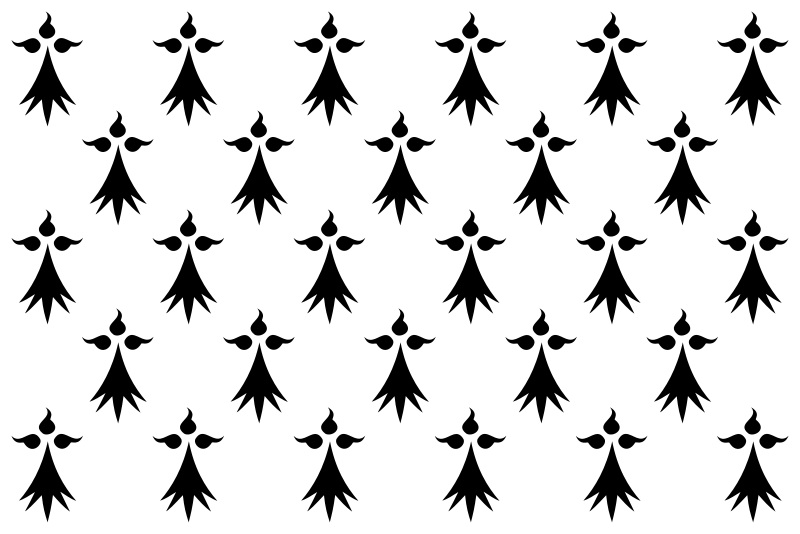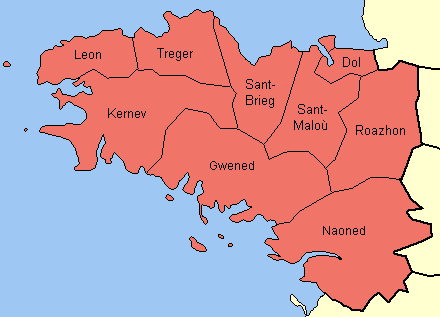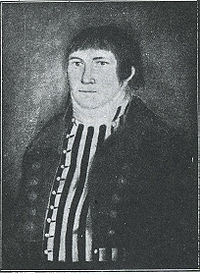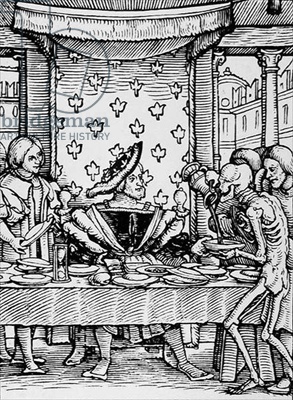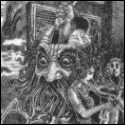|
 Turn is due in 6 hours. Turn is due in 6 hours. 
|
| # ? Nov 27, 2012 16:59 |
|
 Letter to the Bretons posted:My subjects and friends,
|
| # ? Nov 27, 2012 20:26 |
|
 Turn due in one hour and sixteen minutes. Turn due in one hour and sixteen minutes. 
|
| # ? Nov 27, 2012 21:43 |
|
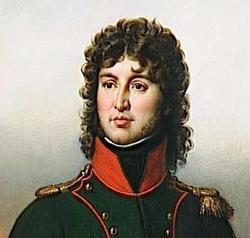 A somewhat late arriving letter from
|
| # ? Nov 27, 2012 23:17 |
|
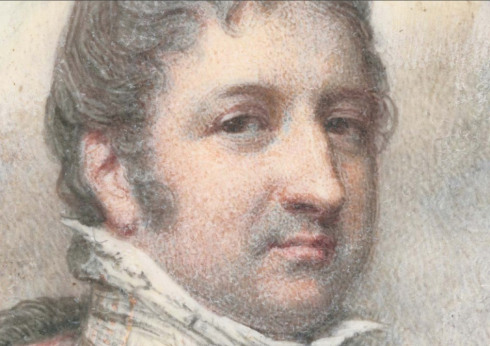 490x346 Louis Philippe de Bourbon, "Citoyen Unité", Minister of Finances An Apology to The Traitor King and His Steward And A Response to Some Arguments Made By Both posted:First, I admit that Myths and Facts was a poorly written document. I take full blame for that. There has been several arguments within that pamphlet that fell apart under further scrutiny. We are men, and men are fallible. I will spend some time talking about faults that I have found with my own pamphlets, as well as respond to critiques of the more legitimate arguments that I made within the pamphlets.
|
| # ? Nov 27, 2012 23:31 |
|
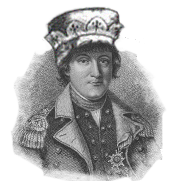 'Steward of the King' Charles Armand Tuffin, marquis de la Rouerie Steward of the Throne of the Elective Duchy of Breizh/Brittany for Duke Loeiz II Popular Song Amongst Breton Soldiers Waiting for the French Assault posted:Do you hear the Bretons sing?
|
| # ? Nov 28, 2012 03:13 |
|
 code:
|
| # ? Nov 28, 2012 03:28 |
|
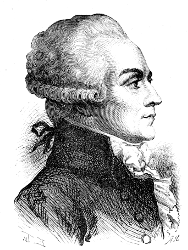 You at the Bretoncades listen to this! No-one is coming to help you to fight! You're on your own, you have no friends! Give up, your guns or die!
|
| # ? Nov 28, 2012 03:36 |
|
Toussaint, overlooking the Haitian flag flying in the wind:quote:Rouge - la flamme de la colère!
|
| # ? Nov 28, 2012 03:41 |
|
Let us lighten the mood again with another iteration of Père Duchesne's "Les pages drolés": "Do not despair, citizen Capet, for the more that things change, the more they remain the same"
|
| # ? Nov 28, 2012 04:15 |
|
Sexy turn preview.
|
| # ? Nov 28, 2012 23:38 |
|
Ottoman turn preview
|
| # ? Nov 28, 2012 23:57 |
|
NEWS FROM THE BURNED HUSK OF A BUILDING IN PARIS: - The Acquisitions Committee is formed by the National Assembly with the passage of the the Wartime Acquisition Act, to be headed by Général Joseph Marie Servan de Gerbey, Commander of l’Armée des Pyrénées. This organization has vast, sweeping powers and many Orleanists in particular worry that it has been granted too much power. - Letters of Marque are offered to all foreign privateers and sailors willing to fight against the Royal Navy. In the Caribbean in particular, many take up the call, reporting to de Sade in New Orleans to collect their bounties on British vessels. British trade with Haiti is disrupted. - The American government refuses to purchase Haiti despite the passage of the Sale of Saint-Domingue Act, on the advice of the Secretary of State William Short. - The Emigre Land Re-Allocation Tax Break vastly removes much of the sympathy for the Enrages in the farmsteads beyond the borders of Picardie. It simultaneously cuts from the budget, however... - The Wartime Labor Act passes, allowing women to work in industries throughout the country. Given, the industries are more or less in their stages of infancy, but it is a first and important step on the road to equality. Women face widespread discrimination in their new factories and many employers sideline them or force them to perform particularly degrading labor. The amendments proposed by the philosophes do not get greater attention. - The Church Restruction Act likewise passes, though Thomas Paine is (perhaps to his good fortune) not chosen as the schismatic church’s head. DOMESTIC NEWS:  - Construction of cottage industries in the Rhineland is complete! Hundreds of workers flock to these next steps in industrialization, as a healthy output of small arms, cannonballs, and other war manufactures reaches the Army of the Rhine on a regular basis. The placement of these delicate and important industries right on the border of a foreign power, however, seems likely to make them a target for the advancing coalition armies. Many question the late Luckner’s judgement. - The high taxes on the nobility and the continued anti-aristocracy policies undertaken by the government in Paris have caused the final and last stage of the emigration - and with the heavy troop concentration along the Rhine and the British blockade, the only location these nobles can flee to is Brittany. Simultaneously, the last remaining income derived from the Emigre Divestment Act runs dry, and as a result tax income derived from the nobility plummets. The only remaining nobles in France are those few who are loyal to Louis Philippe, those few who believe that the Orleanists can protect them and are merely weathering the storm until a constitutional monarchy can be restored. 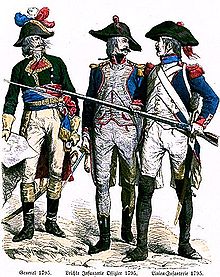 - 40,000 new recruits arrive to replenish the Army of the Pyrenees - most untrained and theoretically little better than a peasant army, as is the building norm. It will be up to the generals to ensure these are not the mere peasant armies of old, but willing forces of revolution. Of these, 5,000 men are assigned to cavalry. Most of these men have never mounted a horse in their life, and with the disappearance of the equestrian nobility, training them will take some time. - Joseph Marie Servan de Gerbey has his soldiers dig in for a defensive war against Spain, but it is readily apparent that the Spaniards have little desire to press the attack across the Pyrenees, especially not during the Winter - they do the same. Minor skirmishes occur in the mountain passes as each side attempts to secure them, but the lack of any real commitment of forces on either side means they end with few casualties and little change in control. At the least, however, the troops who return from such expeditions are eager to report details of the region’s terrain to de Gerbey. - de Gerbey begins work on a new strategic treatise, “On War”. No one is certain what to expect from the general, but it promises to be a strange new look on the call of duty that is modern warfare. - de Gerbey attempts to whip up Catalan and Basque nationalism across the border, but his translators - either through accident or design - misspell several Basque words and utterly embarrass him in southern Navarre. The Catalans prove more amenable, though the general lack of a liberal bourgeoisie in the region and the utter dominance of the clergy means that they make only a few inroads. - The Acquisitions Committee takes a series of severe steps that move the Revolution in a more radical direction. The details follow, though in general, the popularity of the Montagnards increases as the momentum seems to be in their favor. This may impact the upcoming elections. - Horses are confiscated in bulk from the old noble estates, the new horses being used to help train additional cavalrymen - particularly in the Army of the Pyrenees. When word of this reaches the Picarde Commune, the men angrily dare the agents of the Acquisitions Committee to try to take their horses. - They also attempt to seize half of all the horses belonging to the remaining nobility in France. Those who resist are “tried” for treason and executed on the spot. This has the side-effect of spreading the guillotine to many outside towns and villages, and the people - hungry for blood - join the committee in taking their vengeance on the nobles. Shocked, the last stage of emigration in the nobility begins as they flee en masse. - The bells of many churches throughout France are seized, melted down into copper and distributed to manufacturers for mass production. Anti-clericalism is on the rise in France. As the Acquisitors leave, many priests are forcibly evicted from their churches by the peasants as they establish branches of Paine’s new church. - Private ownership of firearms is declared illegal by the Acquisitors, claiming that sedition threatens the republic. This completely declaws the National Guard - at least officially - as the militiamen are no longer legally able to bear their own arms. Though many outright refuse the suggestion, claiming that they are all that stands between Paris and chaos, a sizable number turn in their arms to the Acquisitors, who then deliver the weapons to supply centers for the army. - The petit bourgeoisie are put to work. Small workshops spring up throughout the country at the instigation of the government, drawing from their healthy manufacturing budget. Results are likely to come by next Summer. - Advisors who had previously been working to train the Bretons in stealth warfare suddenly and abruptly depart. This unnerves some of the recruits who had been working with them, though ultimately the advisors have ensured that a guerilla war with the Bretons is likely to be a costly affair. - The Collectivist Manifesto is translated into English, Irish, Italian and German and is soon spread between the universities, clubs, and intellectual circles in Europe by an unknown force - though the secretive nature of the distribution leads many to believe that it is not the work of the Enrages. Most farmers can not read it, though it gains a strong following among the sparse educated class in southern Ireland. - A small band of brigands is caught attempting to burn grain stores outside of Nantes, most of it shipped in from Egypt or Britain. As they approach the warehouses, they are caught by a patrol, and then slaughtered as they attempt to make their way back across the Loire. On their bodies are found notes issued by the French government for later redemption. - The local police keep a particularly close eye on the governor of Toulon on orders from Paris. The implied threat is that, should he even dream of handing the city over to the British, he will be guillotined... or worse. - The Tribunal révolutionnaire (Revolutionary Tribunal) is formed in early January, as outlined by the constitution. It is composed of a jury, a public prosecutor, and two substitutes, all nominated by the Convention; and from its judgments there will be no appeal. - Louis XVI, King of France and Navarre, Duke of Brittany, is brought discreetly by his agents towards the border with Austria. As the snow begins to fall and Christmas fast approaches, orders from the Regent suddenly stop coming in. So do supplies, and food runs out not long before New Years. Rumors spread among the king’s protectors - has Stanislas died? No, even if he had, the comte d’Artois would have been able to send in orders. Had the orders been lost? Perhaps, but they had waited at the designated towns, at the designated times, and nothing came. There is something foul afoot here, something fouler than the stench that was rising up from the king as illness starts to overtake him. The Regent has betrayed them. Left them to die. Snow has built up so thick that they have no choice but to stop in a small peasant village not far from the Austrian Netherlands - or perhaps in the Austrian Netherlands. Who can really be sure? - On the third night of their rest, after winning some food and shelter from the locals, the blizzard grows particularly heavy. As if to bring bad tidings.. and those bad tidings swiftly come true. Three men knock on the door of the shack where the sickly king is in hiding. They claim to be Breton messengers, with urgent news of the king’s daughter. The man stumbles out of his bed with what strength he can muster, pushing past his guards and throwing the door open. The “messengers”, in their haste, completely forget their orders and bullrush the king, knocking him to the floor. They scream loudly at the king’s protectors, who are disoriented, and quickly announce that there is to be a trial. - The king rises to his knees, verbally scolding his newfound captors, tearing their ideology apart word by word, standing up for the divine right of kings, demanding proof of their legitimacy, proof that they have any right to try him. They stare at him in stunned silence, so stunned that the king boldly rises and walks out the door. As his feet leave indents upon the settled snow, one of the men bursts out of the hut and fires a single shot. It whizzes past him. He advances slowly further towards the frozen statue at the center of the town, the lingering legacy of King Henry IV. Another shot soon after. It hits him in the stomach, and he falls to the ground. His hand extends, feeling at the ornate statue’s base. By the time the final bullet passes through his skull, le Roi est mort. Vive le Roi.  - The king’s last orders are found by the villagers a day later - orders that included sending carts filled with food and supplies to the starving hamlets on France’s border. He was not a bad king, they decide, as far as kings go. - Le Pere officially endorses the Babeufist-Rouxist project in the Picarde region. This leads many to worry that the paper itself will be shut down by the government, but for the time being no action is taken against it. Some of his followers go north to settle in the collective, though the lack of any large cities in the region means that the rural-dominated collective proves a fairly inhospitable home for the urban laborers. - More men begin filtering into the sewers and make war their primary objective, slaughtering any and every person they come across. The deeper catacombs remain untouched, but the sewers themselves now bear host to a new breed of interloper... for the time being. - A small paper opens in Nantes. In a series of scathing articles written by anonymous authors, it plays up the divide between the Marianists and the Patrilinealists in the wake of the death of the king, all while taking no sides of its own. It has believed links to the Enrages movement. This attempt is largely stymied, however, by Louis Stanislas’ “concession” to Marie. - Pamphlets featuring Robespierre’s tyrannical metallic arm strangling Alsace begin to leak in the French Rhineland. Small Alsatian villages look to de Tillières and his men for protection from both the demonic half-man ruling in Paris and the advancing German army, and thanks to de Tillières strict defensive stance, opinion of him in the region increases. - Prussian troops remain encamped just outside of French borders, waiting for winter to pass before crossing the Rhine. - “We will handle the East, you handle the West!” These pamphlets, distributed by the Prussian embassy in Brittany, become a symbol of the strategic and political alliance between the German states and the Duchy of Brittany. Battle of Jemappes 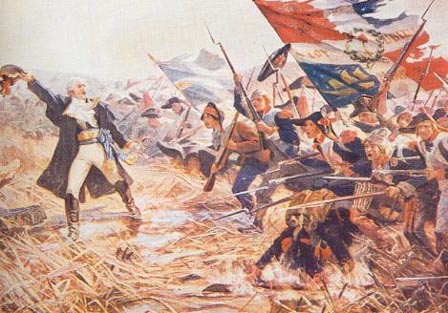 - In the winter of 1792, General Andrea Massena decides the best way to prevent an Austrian and Prussian invasion of France is to invade the Austrian Netherlands before the Coalition can make their move. He gathers his 44,051 soldiers, 500 cavaliers, 2000 patriottes and 50 cannons and heads for the Austrian border. He crosses just before the first snowstorm hits. - The Austrian Army, commanded by Crown Prince Franz de Hapsburg, sees the French soldiers approaching in the distance just as the first flakes of snow begin to fall. Although the Austrians have 20,000 highly trained and heavily armed troops, they are scattered across the territory. In reality, the man has about 11,000 troops to defend the city of Jemappes with. He sends his assistants to gather the disorganized forced as soon as possible. - The French Army hits Jemappes like waves upon a rocky shore. The Prince has entrenched his soldiers just outside the town. Despite having nearly double the numbers as the Austrians, several of Massena’s assistants make enthusiastic but otherwise unnecessary movements that result in heavy losses. Massena is forced to dismiss these individuals and take direct control of the army. With momentum stalling, Massena leads a final charge against the Austrian ranks. - Despite significant resistance, the Austrians are forced to scatter and retreat. The Austrians fall back to Brussels, giving France de facto control of the Walloon region. The victory is nominal, with heavy French losses, but it greatly increases confidence for the Republican government in Paris. Massena is commended by his own soldiers and by local French officials for his bravery. - 4,131 French soldiers perish, taking with them 60 cavaliers and 560 patriottes. The Austrians lose 4,600 soldiers and are forced to withdraw leaving their fortifications behind. The battle is now over though, Massena pursues the fleeing Austrians with hopes of catching them unaware. The snow is now thick over region, making travel difficult. Battle of Brussels  - By the time the French Army has arrived, several of their wounded from the previous morning’s battle have perished and their bodies left to freeze in the snow. They find Franz standing on the half demolished ruins of the Second Wall of Brussels. His cape blowing in the breeze, he looks like some sort of strange angel standing upon a fallen foe. The Austrians have been busy making emergency fortifications to the city. Strange shapes jut out of the city at random. Rubble has been scooped up and stacked. The Prince raises his sword and screams to the heavens. - Austrians seem to pour out of every open hole, running toward the exhausted French army. It seems reinforcements have arrived to help after the failure at Jempannes. The Austrian assault is only half successful. Just as the French took heavy casualties in Jempannes, so do the Austrians. - General Andrea Massena attempts to use his numerical advantage to discourage the Austrians, flanking them from several sides. The French are forced into a small retreat as Brussel peasants bombard the armies from above with makeshift weapons. - French lines begin to break. The troops are exhausted and morale is down. General Massena sees what is happening and orders a withdraw. His forces quickly retreat to Jempannes. The fight is largely a draw, with both sides claiming victory. The Austrians for holding the French off and the French for significantly weakening the Austrians. Their hold on the region remains weak. - 3,581 French soldiers are killed in the fighting with another 804 dying due to attrition. 34 cavaliers were lost and 480 patriottes. Austrian casualties are unknown, but there is an extremely interesting rumor that the Crown Prince was severely injured in the fighting. Some say even now, he struggles for his life.  - l’Armée des Alpes authorizes a full mobilization of its forces, calling 40,000 men from across France into action. When the soldiers arrive, they are astonished by the appearance of philosophes on the field giving orders. It takes prompting from their superiors, but the men begrudgingly accept their direction. There remains some dispute within the ranks what use, if any, these “armchair generals” can be. - Nonetheless, Les Philosophes are given private tents near training facilities for their research. Under the direction of Nicolas de Condorcet Lazare Marguerite begins experimenting on the use of airballoons for reconnaissance and intelligence gathering. He gathers an assortment of materials but ultimately fails at producing anything substantial. Issues remain over mass producing hydrogen and maintaining aircraft stability. Marguerite requests more time from General Ney, convinced he is on the edge of a breakthrough. - Nicolas-Jacques Conté, on the other hand, makes a major breakthrough and produces what will one day be considered the first modern lead pencil. He is derided by passing soldiers for wasting such time on such a minor endeavor, but in truth the invention is a boon for military planners and generals who are unable to import graphite with the ongoing blockade on French ports. Small samples appear in Paris, where they become a favorite tool for artists.  - The philosophes catch Officer Claude-Joseph Rouget de Lisle writing music late at night instead of military plans. Instead of giving him up to his superior, they choose to help him finish his work. The Chant de guerre de l'armeé du Rhin is finished the 17th of October and published nationally. It becomes a rallying cry for all of France, both Jacobin and Royalist. Orleanist and Babeufist. - In the midst of these Revolutionary accomplishments, however, the old ways of training prove just as useful as the new. General Nay’s l’Armée des Alpes is given training through the winter. Unlike his peers, Nay opts for more basic training than the grueling work that has become common within the French army. Not feeling overburdened, l’Armée des Alpes experiences a noticeable increase in morale. - A large number of Parisian gravediggers go missing. It is assumed they fled Paris, although no one is sure why given the significant uptick in business. 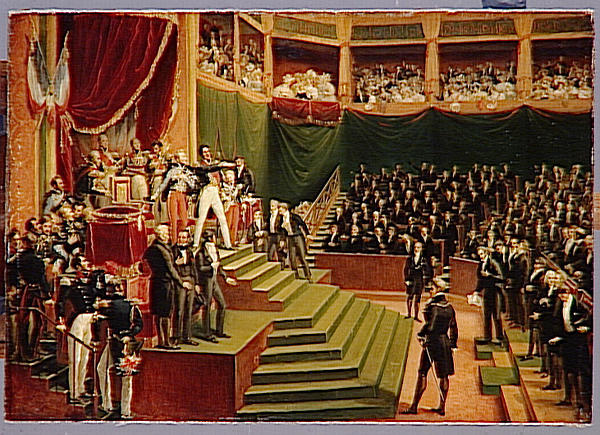 - As the winter grows cold and harsh, tensions between the Orleanist party and Paris bourgeoisie experience a thaw. The phenomenon results from the young Louis Philippe, making significant efforts to reach out to the rich across France. This includes giving out awards for the highest taxpayers to use as status symbols in the New Republic. The quasi-legality of these rewards is debated. However, as Louis is a member of the government in all but name, the effort is accepted by all but the poor and middle class, who oppose such blatant bribery. - This ultimately undermines Louis Philippe the Younger’s efforts to start a new newspaper aimed at the poor entitled “La Famille”. Readership is low, but enough to barely keep the paper in business. Fellow publisher Le Père Duchesne publishes several political cartoons mocking Louis Philippe for attempting to sneak in on their market. Articles on proper farming techniques are burned for warmth, the plows having been put away months ago. 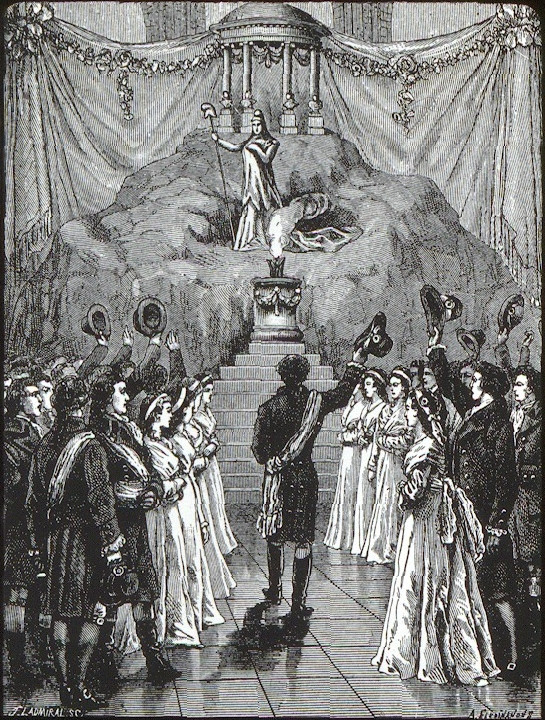 - This blow is worsened through Young Louis Philippe’s support of the Theophilanthropic Church. While he manages to woo some dissatisfied priests, largely the same ones who agreed to the Declaration of the Clergy of France, the Catholic Church largely remains in place. Many mainstream French citizens cannot understand the logic of appointing a foreign Deist, known for his ridicule of Christianity and those who practice it, to what is in essence the head of the French Catholic Church. Thomas Paine himself is rather confused but begrudgingly accepts. - The poor imprisoned by the Rainbow Guard are freed on the verge of starvation after denouncing their former Enrages political affiliation. Bitter over the whole ordeal, the newly freed sans-collette form the “Not Enrages”, which in an astonishing turn of events, seems to be identical to the newly banned Engrages party. They burn effigies of the President to keep themselves warm. - The first Elections of the French Republic are held with all eyes fixed upon Paris. After all the chaos, it is uncertain what sort of future France will pick for itself, or if the elections will even be fair. - To no great surprise, the Jacobins become the majority party in France. They pick up 422 of the seats in the Legislative Assembly, reflecting their own dominance of the French political system. There is some suspicion of foul play but these rumors are silenced by unknown forces. Another 187 Orleanists are elected, serving as the main ‘Minority Party’. The remaining 91 seats go to various Independents, a large number of them Enrages except in name. They are peasants and looked down upon by the more prestigious members of the body. 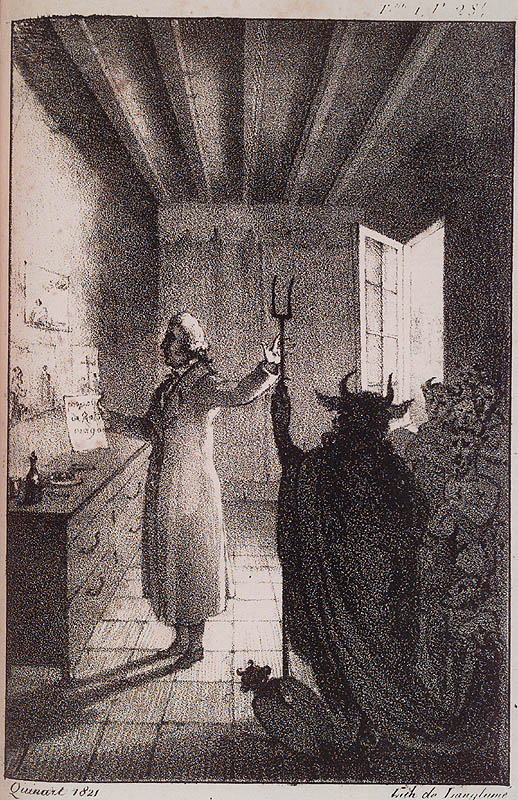 - Berbiguier’s popularity experiences an inexplicable increase, with research assistants arriving in droves to his office to join the Department of Gnostic Conjuration and Experimental Thaumaturgy at the University of Paris. These glassy-eyed followers can be heard murmuring about “purification” and “finishing God’s plan”. Berbiguier uses the large influx in interest and his government connections to threaten the University President into giving him more funding. The University is powerless to stop the mad genius. - He uses this money to increase focus on a chemical he calls, “nitroglycerin”. Mastery of the strange material remains out of his reach, however. Fellow professors begin to deride the scientist for pursuing a “made-up compound” that could not possibly have any use. These voices are shut up quickly by smiling research assistants who claim Berbiguier just needs more time. The Lord will provide him with the necessary tools. Just wait. - The smell of sulfur pervades parts of downtown Paris and pamphlets on demonology are spotted fluttering in strangely empty streets. Something queer is happening in Paris. People seem either excited or terrified. No one has gauged the true numbers. 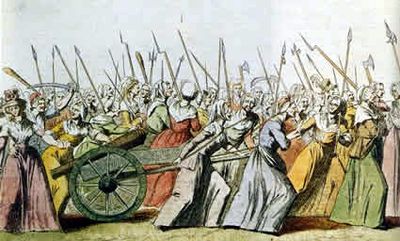 - With the wind howling outside, Madame Gouge meets with the remainder of her Revolutionary Guard. She offers her members a choice, either they can remain with her and fight or go join the Picarde Collective. It will be long, hard work with no guarantee of success. Picarde may be more immediate, but with a much less satisfying outcome. For a moment, no one speaks. No one moves. There are no big speeches, no rallying cries, no great demonstrations. Nothing more than determined silence greets her words. They will not abandon their cause, liberation of all French women. The group renames itself the Liberation Army. - Humanitarian aid in France picks up through the winter, with the Liberation Army distributing most of the aid. The sudden and unexpected collapse allows the Liberation Army to make significant inroads in the Parisian poor. The Liberation Army is a legally grey organization due to their associations with prominent Enrages, but for now they are welcomed as heroes in Paris. - The Liberation Army tries to expand their operations southward but runs into a number of problems. First, the organization tries to clear and rebuild Signes following the disastrous battle there a few months prior. Their lack of demolition or construction knowledge ultimately prevents any progress being made. Next, the group attempts to distribute aid to the urban poor in Occitania. A lack of Liberation Army presence in the region makes this extremely difficult and in several instances the aid does not arrive at all. The only program with any significant success is a "swords and plowshares" initiative, where the group sends fighters to act as protectors of Occitanian towns. 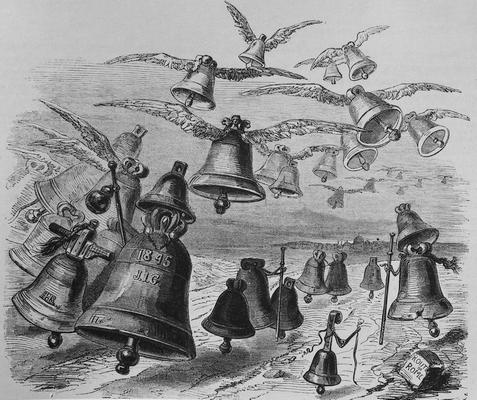 - As the church bells are torn down in a small village along the Breton-Vendee border by the acquisitors, a band of peasants surrounds and brutally murders them, hoisting the five acquisitors and their guards up onto a nearby tree, where they hang. The town council soon declares that they are joining the Bretons in their revolt, and several other border villages follow. If this is not contained, it may spread throughout the whole region! - In an attempt to resolve their lack of presence and prevent future problems, the Daughters of Justice open Society of the Friends of Truth clubs across Southern France. It is used to spread feminist ideology and democratic ideals. The Society of Friends and Truth are significantly less popular in Southern France, but a limited number of women do join, exclusively former nobility. They bring a decidedly more royalist flare. - Rumor spreads of monks crawling out of sewers and drain pipes by the dozen. Their motive and alignment is unknown, but they scurry quickly from their holes dragging as much as they can behind them. The reports create quite a stir for local newspaper. - Alexis Le Veneur de Tillières continues his strenuous training, sparking outrage from his men who are utterly exhausted. Have they not trained enough? Does Alexis not trust them? Order is retained but morale suffers a massive decline. Extra firewood does nothing to lift the army’s spirits, especially after word of the lax standards in l’Armée du Nord arrives. -Officers in l’Armée du Nord pour over maps of the Rhineland and Alsace, sparking suspicion the French Republic is planning to attack Prussian forces soon. Supplies are set aside and an expeditionary force is organized. - Riders arrive in the Alsace and Lorraine regions informing German settlers there of the opportunities that lay ahead if they assist in the Liberation of Germany and defense of the Republic. While some do take heed and join, most would rather maintain neutrality. They do not want to oppose their fatherland or their adoptive motherland. - American Ambassador William Short boards a ship to his home of Virginia through Brittany. What he finds when he arrives might make him wish he stayed in France, however. 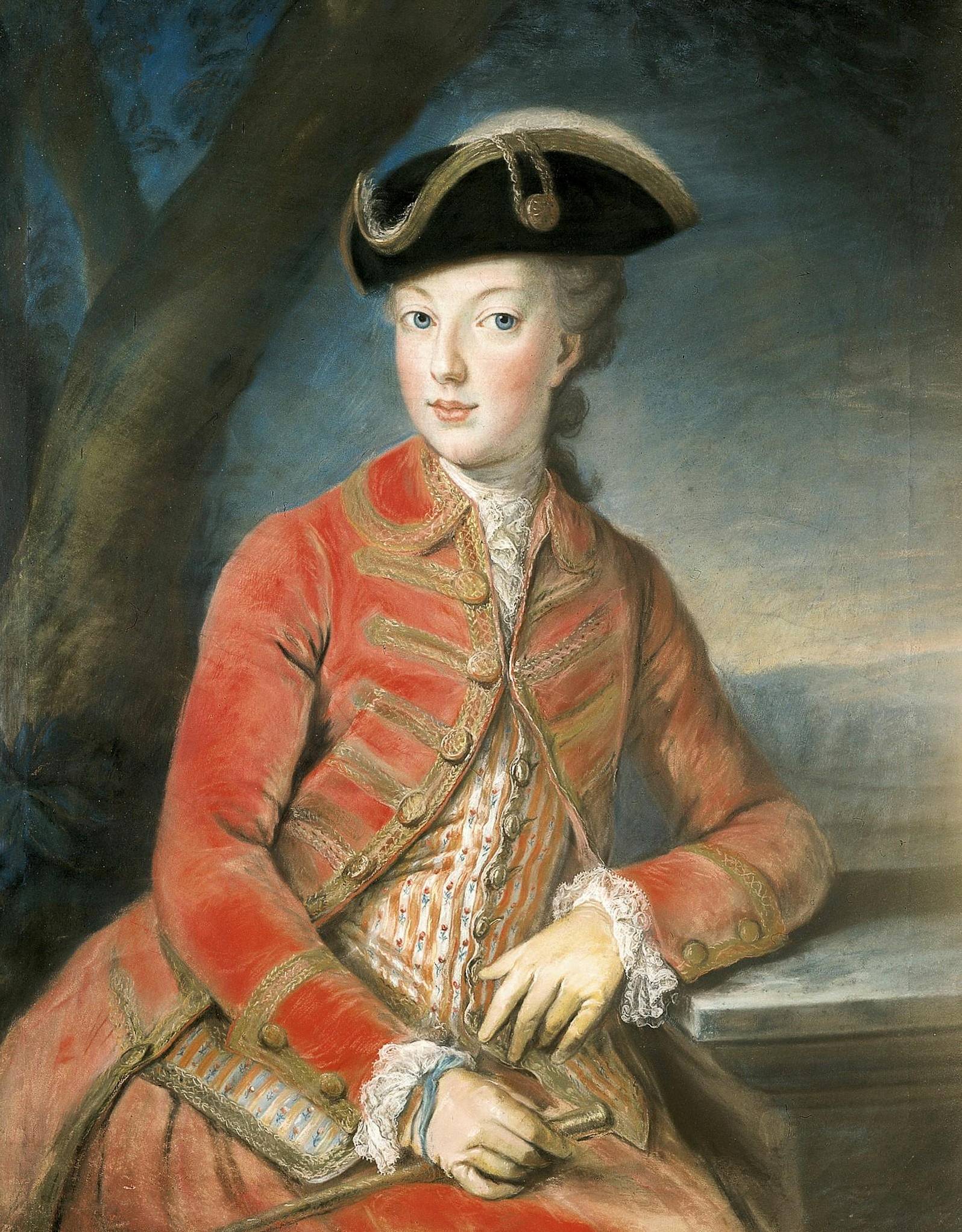 - Marie Antoinette, tired of remaining trapped in Virginia purchases a horse and rides across North America, gathering members of the Queen’s Association as she goes. Her ferocity cannot be described in sheer words. She leaves a trail of frightened newspaper men in her wake. After gathering a substantial host in Montreal she purchases a ship and sails to England to seize control of the Queen’s Association there. - Decked in armor and with a total of 1,000 soldiers behind her Marie Antoinette storms the beaches of Normandy. As the city of Boyex falls the soldiers can be heard screaming “For Marie!” in French and English. Her forces are largely a paper tiger, though, and would be unable to stand up against more than tribute forces - With extreme caution, Robespierre begins to convert the Committee of Public Safety into an advisory and law enforcement intelligence agency. It is placed under Robespierre’s explicit control. The members of the body are, dissatisfied to say the least. Mysterious anonymous pamphlets accuse Robespierre of attempting to crown himself “Despot of all France”. - Robespierre ignores these accusations and attempts to build a base of supporters within the low and middle class. While the middle class’ allegiance is easy enough to secure, the poor actively resist the Jacobin attempts to expand. It appears Madame Gouge has already put much of Paris’ poor in her debt. Those who do not follow her are stubbornly hoping the Enrages will return. 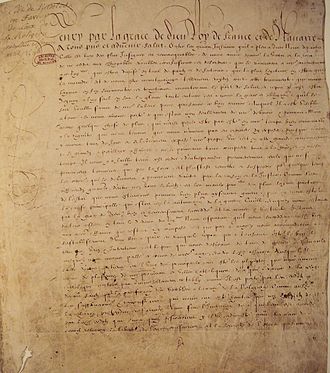 - Robespierre sends an appeal to the Royalist French Armies, stating this will be his last attempt to reach out. He offers amnesty to the traitorous soldiers. Some do accept the offer, retreating in the dead of night to Paris, but most the army remains behind in support of their King. - The President moves his mercenaries to a small fort just outside of Picardy. Travellers heading toward the self-proclaimed nation-state are ambushed and questioned revealing a rainbow of individuals. While some are Babeufists, others are simple travellers or men trying to escape France. Several of those questioned disappear mysteriously. - Meanwhile, Ottoman corsairs are hired by the French government to act as privateers, sporadically attacking the British fleet and smuggling supplies into the country. The pirates are able to breach the British defenses, but what they bring in is insubstantial compared to the needs of the nation as a whole. Attacks are completely unsuccessful, with newspapers comparing the Ottomans to a wasp attacking the British elephant. - The President also promotes his emigre tax breaks, discouraging the poor of France from fleeing like their wealthier counterparts. Instead, he offers them a place in the military. Large numbers join, reluctantly. They are extremely untrained and disorganized. - Murat begins scouring his ranks for promising officers, giving them promotions and having them study experimental naval techniques. Witnesses from the Battle of Sant-Maloù are also sent for, so the French can study British techniques and improve their own. Murat hopes to build a revolutionary new naval force that can combat the British fleet. - Murat asks his commanders to begin running drills, but they loudly point out the British blockade who will fire upon any French vessel they see. Murat gets around the problem by having small dispatches of ships practice in shallow waters. It is inefficient, but the best solution to the problem. Training improves slightly. - Repairs on the Flotte de l’Atlantique, but due to a lack of experience and supplies the repairs are unlikely to be completed until Summer 1793. - Admiral Joachim Murat sends a letter to the French President complaining about African and Asian nations pestering him about financial disputes. He quite frankly has no idea where these are all coming from, given the blockade, and has no idea who this “Prester John” fellow is suppose to be. They are beginning to clog his trash bin. LOUISIANA NEWS:  - There is a building anger in Louisiana, mostly egged on by Jacques Pierre Brissot, who has become a notable firebrand on the streets of New Orleans. Not long after word reaches the city of plans to sell the colony, Brissot openly denounces the government of Lafayette and Robespierre. - Eager to remove his threat to the stability of the colony, the town council in New Orleans votes to fund Brissot’s plans for an expedition north into the territory and to the lands beyond. After a few weeks of preparation, the politician turned explorer sets off deeper into the territory, - With snowfall sighted and winter setting in, he organizes his camp of some forty followers along the Mississippi river, where he encounters parties from several native tribes in the region. The Osage and Quapaw both sign a treaty of alliance with the new colonial government in New Orleans, and the fur trade sees an increase. Brissot makes sure the Indians know it was the Association for Aboriginal Civilisation (an organization of his own founding). - A series of renovations are underway in New Orleans and Lower Louisiana. Of particular importance is the old Cabildo, which was the seat of the colonial administration for many years before being destroyed in a fire. de Sade sets about restoring it, though it earns a new name in the parlance of the locals - the Cadildo.  - The foundations of a plantation economy are laid throughout the more fertile regions of the Bayou, with plantation houses being the foci and small towns of white yeomen farmers nearby. Immigrants are offered land so long as they can clear and drain the land itself. The intention is obvious - avoid the conditions for a slave revolt that were present in Haiti. So far, it is working, and the black slaves in the region remain in “blissful” ignorance of the rise of freed black men to the south. This also marks the beginning of the end of the Louisiana swamp. - de Sade departs from Louisiana and makes a series of speeches throughout the South and eventually to the capital itself, New York. While the mission is purely one of education, supposedly to learn more of the young democracy, he takes the time to meet with many prominent Southern leaders. What the Terror of the Bretons has to say to these men, none are sure. - Napoleon Bonaparte, Emergency Governor of Louisiana begins a recruitment drive, seeking to increase his numbers by about 1,500. The steady stream of refugees proves to be a perfect supply for this and 1,300 men are recruited. These men form a garrison around New Orleans and are responsible for the defense of the city. 500 of Napoleon’s own men are sent to train these new recruits. The results are slow but apparent. - De Sade’s troops are further trained, increasing their overall effectiveness and skill. The Demons of France have come a long way from their humble beginnings. The change does disappoint some though, who wish to return to the days when they worked for anarchism, not Louisiana. Small defections begin. 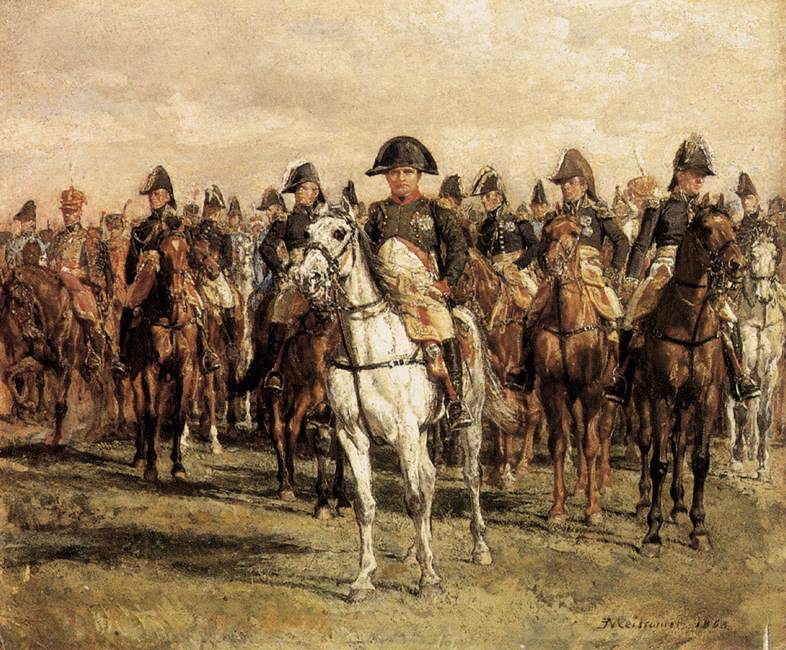 - By the end of January, Napoleon has set the groundwork for most of his forces. While the education is by no means comprehensive, it is all he needs for the time being. He takes all but 4,000 soldiers from across Louisiana and begins patrols of the border settlements. These discourage most attackers, although Napoleon catches a handful of wrothful Americans and bitter natives. Settlers are escorted northward and Bonerville is rebuilt. In honor of their defenders, the locals erect a large tower to commemorate the town’s reconstruction. - The remaining 4,000 soldiers are put to work constructing a military base near Baton Rouge but without proper construction skills, the project becomes a disaster. Napoleon is left with a barely standing husk of a building on the shoreline. Immigrants are embarrassed for his sake. HAITIAN NEWS:  - Organizing the freed Haitian state into a tangible government and economy proves a herculean task for Toussaint, who soon finds that the freed slaves have little desire to return to working the plantations or forming governments beyond a minor local level. The remaining mulattos prove more willing, and they soon form the upper administrative class, especially in the south where Port-au-Prince sits. Chaos still runs rampant in the new state, and clashes between the liberated slaves - many armed to the teeth - are frequent. - Attempts to form an engineering force are made, and while none of them are really “engineers”, Toussaint does manage to round up enough men to begin a campaign of clearing the roads of debris. - Spanish forces move to the border in Santo Domingo, many in the colonial administration believing the slaves will soon turn on them and preparing for the worst. A band of slaves who had attempted to cross over the border with Haiti are captured and shot summarily. - Officers who had fought in the Haitian Revolution are rewarded with positions of authority over the departments. They soon set up personal demesnes of their own, forcibly extracting payment from their ‘subjects’ - this forces many of the freedmen into the cities, which in effect concentrates power, establishing local identities strongly attached to the closest major city. - Charles Hector, who had disappeared from France several months ago, appears in Port-au-Prince demanding a meeting with Toussaint. Uncertain what else to do, several soldiers arrest him and march him to Toussaint’s office. Upon seeing the leader, Charles Hector kneels and offers all he has to offer to the Haitian state. - Charles Hector is released, but not without some hesitation. He quickly leaves Port-au-Prince for the island of Gonâve, where he purchases a large estate. The manor is staffed with recently freed slaves, who enjoy surprisingly good hours and wages. Rumor has it, Hector has sold all his French possessions to fund his travel and subsequent life in Haiti. 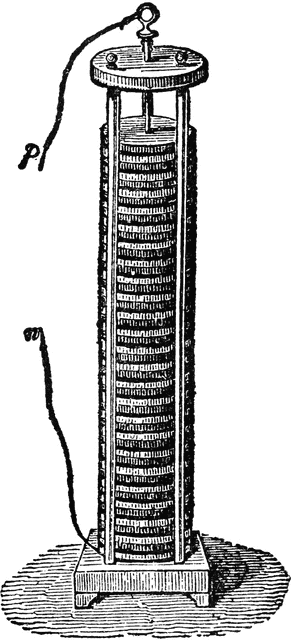 - In his manor, in a secret laboratory buried deep beneath the earth Charles Hector begins strange and mysterious experiments. Glass beakers containing mysterious substances, dozens of machine parts and boxes of wire are all brought to the manor. Whatever he is doing seems to have little luck and servants report Hector cursing and storming around the island. Finally, in early February, Hector emerges with fire in his eyes. He claims he has made a substantial victory. He has generated an electric current! Eureka! He has invented the voltaic pile! Ripples are sent through the scientific community with the news.
|
| # ? Nov 29, 2012 02:40 |
|
BRETON NEWS: - A Prussian officer arrives in Brittany by ship, where he begins a strict training regimen for the Breton troops. Similarities between the serf-based recruitment system in Prussia and that of the Breton military mean that the measures are implemented easily and successfully. The Bretons are now better trained. - The Bleun-Brug officially begin their operations in late December. They position themselves on the French-Breton border and seize any imports from travelling from Brittany into France, enforcing an unofficial embargo on the country. The nearby French departments of Maine et-loire and Mayenne experience a significant drop in their quality of life, with poverty rates far exceeding the national average. Mercantilists spasm over the apparent imbalance of trade and local businesses on both sides of the border curse the Breton government for their interference. The petit bourgeois are not pleased. - Meanwhile, the intercepted supplies are used to start repairs on the Breton coast after the disastrous attack by the Flotte de l'Atlantique. Lodging, medical care and temporary employment is offered to citizens affected by the disaster. The Bleun-Brug generate quite a deficit for their efforts, but the people are happy. - The former Archbishop of Paris is seen wandering around the capital with an entourage of strange gentlemen, who claim to be refugee bishops and great philosophers from France. They put up posters decrying the heresy of Father Roux and decrying his many injustices. Public opinion in Brittany turns further against Babeufism, soldifying the nation as a reactionary stronghold. - At Archbishop Antoine-Éléonor-Léon Leclerc de Juigné’s pleading, the Pope authorizes a small grant of 2 credits to the Breton government, under the condition it is not used for military purposes. He highly suggests using it to support the clergy and their education. - Almost on cue, Archbishop Antoine-Éléonor-Léon Leclerc de Juigné opens seminaries across Brittany to train non-criminal unemployed men to be Men of God. Elaborate religious buildings are constructed across the countryside, with men flocking to join. Unemployment decreases sharply and relations with the Papal State experience a significant increase. - British aid to the Army of All Brittany continues, with large quantities of gold and wealth arriving regularly on the Breton shores. Parliament likewise ships over 10 cannons on lease, though requests for “rockets” cause many to scratch their heads. The rocket is the purview of the savage Indians in the Kingdom of Mysore, and there is not yet any British equivalent. - The Breton border forts ordered several months earlier are nearing completion, though not nearly soon enough. Despite all expectations, there is movement on the border - it looks as though an invasion has been ordered in the middle of winter. The mostly finished structures are unsteady and unstable, but the Marquis orders his forces into them nonetheless. They take up positions in sizable number, the newly delivered cannons jammed into several of them. - Camps are set up throughout Brittany, far more so than the Breton’s army would actually require. It almost looks as though the vast majority of the population has rallied in defense of their country, though that seems logistically impossible. - Louis Stanislas abandons the Austrian Netherlands when word reaches him of Massena’s approaching army, though he leaves his brother the comte d’Artois behind to maintain an emigre presence in the region. Huddled into ships belonging to the British fleet, the aristocrats find the conditions hardly to their liking, and only barely manage to escape the harsh winter that is setting in, landing in the port of Nantes. - Stanislas gives a speech somewhere near Nantes tacitly endorsing his niece Marie Therese as a fine and decent woman, a Bourbon through and through. He even goes so far as to call her the duchess Brittany deserves. This sucks most of the support away from the Patrilinealists, and any divisions in the Noble Assembly begin to slowly fade. - L'Armee des Princes uses vast British donations to hire mercenaries from throughout the Celtic world. Scottish and Welsh veterans from the Revolutionary Wars in particular sign on, with the only Irish mercenaries coming from the region around Belfast. These “Gallowglass” soldiers, believed to have completely disappeared, were once feared throughout western Europe... and now they have returned. They soon meet with Louis Stanislas, and his army is flush with 3,000 experienced and well-trained soldiers, albeit ones who are loyal only to the money he offers them. - After issuing a final ultimatum to his soldiers: join me or leave, a healthy portion of the Armee du Nord (Royalist) follows the comte de Rochambeau into the army of Louis Stanislas. The remainder journey eastward to avoid fighting their former brothers-in-arms, hoping to meet with André Masséna’s army and join him in a push against the Germans. - Cadoudal prepares the men of Brittany for war against the encroaching French forces. He calls on them to take up arms in a campaign of mass resistance, to join in the crusade against the Republican invaders. This is a war for survival, the war that will decide whether Bretons will be free or slaves. So goes Cadoudal’s cry, and the people of Brittany from every village to every town to every farmstead set down their plowshares and pick up their swords. The bombardment of the Breton shores was only the beginning, and should this war be lost, every home will be set aflame, every child put to the sword, every church made an altar of de Sade. - The Ar Diebin Bretoned waste valuable time attacking and surrounding the obviously fake camp set up in the north along the shores of the English Channel. There are few actual soldiers there, perhaps a few hundred, though the Bretons mercilessly kill those they can find. As a result, their forces can not be called to arms in time to meet the French Army’s initial advance. - The French, meanwhile, arrive in force. The war drums of the Armee du Centre echo the beating of the Breton’s hearts as they pour against the banks of the frozen Mayenne. Some forty-thousand French soldiers expect an easy crossing, the river being in French territory. Bretons suddenly appear, the men on the opposite side of the river open firing on the massive French line. The numbers are simply too many. The French artillery overwhelms them, with cannonfire obliterating the half-finished structures they stand by and forcing them in on themselves. Lafayette orders his men across to drive into Nantes, where his scouts have brought him reports of the Army of All Brittany on the move. He hopes to force a direct confrontation and make his name feared among all Bretons. - As they are carefully crossing, the men notice small sticks scattered throughout the river. Flaming arrows suddenly descend on them, many hitting these tar sticks and setting them alight. The fire breaks the ice, which caves in on the interlopers, with hundreds falling into the frigid running river beneath and drowning. Of those who are pulled out, many die later of hypothermia. Lafayette orders wood brought in from the supply carts to form a bridge, but as he’s doing so, skirmishers dart around the ruined border forts, quickly taking up position in a poorly formed line and aiming. Lafayette’s troops fall to the ground, the planks falling unceremoniously with them. One of Lafayette’s officers even falls dead to the barrage. A counterline is formed on the opposite side, and with overwhelming numbers the sharpshooters are forced to fall back to an unknown location. - Finally feeling somewhat secure, Lafayette manages to cross the river with most of his forces as snow falls all around them. As the days pass, Breton harassment continues almost incessantly, and though the inherent advantage lies with Lafayette’s troops, each village they come across is openly hostile to them, even as Lafayette tries to hand over the land of the local nobility to them. Lafayette’s troops are forced to fire on civilians constantly, as many of the Breton soldiers have taken to disguising themselves as peasants, and he can never truly be certain who is a friend and who is a foe. Though the vast majority are foes... and every peasant killed turns more of them against the invaders. - By the time Lafayette moves further inland, his supply lines have been severed by continued raids on the wagons travelling from Caen, and much of the food he had brought with him has been lost to endless guerilla attacks across the snow-covered Breton plateaus. The Montagnes Noires, though never extending as high as those formidable mountains in the Pyrenees or the Alps, have a distinct, wild character to them that makes crossing extraordinarily difficult for Lafayette’s invading troops - especially in the winter. Hundreds desert, fading into the mountains. - Battered and bruised, but not broken, the Armee du Center finally reach the outskirts of Nantes, where the British expeditionary force (of somewhat questionable quality) bombards them with garrison artillery and continual musket volleys. The Army of All Brittany is nowhere to be seen, however. The camps set up throughout the region seem to have misled Lafayette’s scouts... when an entire host of Breton forces descends on him. They are led from the rear by the Charles Armand Tuffin. They are outnumbered by the French, who promptly form into lines and return fire. - They are too disorganized, however, too wearied by the march across the Breton slopes in the middle of winter. Royalist reinforcements and the sally of the British end any hope of a tactical victory as soldiers in the army begin throwing down their arms and abandoning their places in the line. Despite overwhelming odds, the Bretons - joined by their royalist allies in the form of Louis Stanislas and the remnants of the comte de Rochambeau’s army - repulse the Armee du Centre away from the city. The French regroup somewhere in central Brittany, not yet truly defeated. The Bretons have lost thousands of men, and while they actually killed far less men than they lost, the elements, desertion, and continued strikes at the soldier’s morale did the rest. The term Guerre petite would later enter into the English language to describe a war fought by a smaller, inferior force with unconventional tactics. - The Bretons lose 3,620 men and all of their donated cannons. The British lose 2,210 men. The Royalists lose 515 of their elite mercenaries. The French lose 7,153 men to disease, desertion, and Breton raids - though most of Lafayette’s loyal National Guard recruits survive the campaign. - Bathed in glory in the aftermath of their heroic victory, the Bretons call a conclave in the twice-saved city of Nantes. Loeiz II has died, and his successor must be chosen immediately. In the presence of the Archbishop of Paris and the Bishop of Nantes, the Noble Assembly cast their votes and unanimously elect the young princess Mari as Mari Tereza I of Brittany. Cheers go up in her name, and she pledges to righteously rule over the duchy as her father would have, and to establish a ruling family for the Breton people. - A significant number of American entrepreneurs begin investing in Brittany and Breton businesses. The trickle of aid stops abruptly after America’s political turmoil comes to a head. PICARDE NEWS: - Elections are held in the Picarde Collective, with overwhelming turnout thanks to colour-coded, illiterate friendly ballots. The Enragés Party wins an astonishing 98.5% of the vote, electing 99 of 100 Representatives in the People’s House. The last representative is a self-described, “Royalist Babeufist”. No one takes him seriously. Father Roux is elected head of the Enrages Party in the Seat of Amiens. - The Constitution is unanimously approved in the People and Worker’s Houses during the first meeting of the Assembly. The body also introduces conscription, a remarkably controversial move, thanks to the rallying cries of Father Roux. 10% of all men are enrolled in the Picarde military, 10% of all women into the New Revolutionary Guard. Another 5% of unemployed men are taken off the streets to serve in “government essential” industries. - Claire Lacombe manages to largely avoid what would later be called the “Enrages purge”, meeting somewhere north of Paris a number of Enrages who escaped mostly thanks to leniency on the part of President Louis Philippe. The Picarde Collective welcomes them home with open arms. - Lacombe is elected to the Assembly in Picardie by an overwhelming margin. She becomes the first woman in modern history to hold elected office! She sets to work organizing the defenses of the nascent state, studying tactics and strategy from the scant few military men who are sympathetic to their cause. - Most of these soldiers are sent to patrol entrances around Picarde to deter foreign involvement. The only invading forces seem to be the snow, showing how little interest most of Europe has in dealing with the minute Republic for now. - The Picarde Collective authorizes recruitment drives in the Austrian Netherlands, but officials are arrested the moment they cross the border by patrolling Austrian troops. The operation is a complete failure. Attempts to improve popularity in metropolitan France have a little better success, with the Collective gaining a significant minority of followers in Lille. This is blamed on the destruction recently witnessed there. FOREIGN NEWS: - After significant lobbying from the British and Portuguese governments, Spain declares war against the French Republic. They cite the forced reaquisition of Louisiana, disruption of trade and the desire to restore the Bourbons to the throne as their casus bellis. A small fleet of Spanish ships join the British in blockading France, but ground forces see little movement. - The British government briefly considers blockading New Orleans but convince themselves such an effort is unnecessary. Louisiana is doing little to aid their mainland counterparts and if needed, the combined British-Spanish forces can take out De Sade’s mockery of a nation. - Instead, they shuffle some of their naval forces into the Mediterranean to cut off Occitania from outside trade. The blockade has unpleasant effects on South France. Corsica, long beleaguered by internal strife, letters from mainland France and economic pressures declares independence from France and forms the Anglo-Corsican Kingdom. Pasquale Paoli is selected as President of the Council of State with King George III acting as the reigning sovereign. Britain rushes to establish military bases on the island. - President Elect Hamilton announces he will not ratify any agreement that would transfer control of Saint-Dominique to the United States. He feels the Haitian people are quite capable of governing themselves. If anything, the US wants the Louisiana territory. Hamilton’s speeches cause Congressional support to dry up. - Meanwhile, President Washington uses his lame duck period to authorize the construction of forts within the Northwest territory. Although the bill explicitly prohibits the construction of forts in Louisiana, several ambitious settlers do just that. American forts are erected in northern Louisiana. - The Cumann na nÉireannach Aontaithe (Society of United Irishmen) establishes itself firmly as the premier movement for Irish independence, bridging the religious divide and uniting Catholics, Presbyterians, and other religious dissenters against monarchical rule in Ireland. Though not yet taking arms, the British government is eager to crush the organization lest the French Revolution spread to its borders. - Protestant-inciting propaganda spread throughout Prussia and the North German states fails to take hold. Though many in the lower classes - and even the aristocracy - are heavily suspicious of the Catholic Habsburgs, they are much more afraid of the radical republican French. - The Bourbons in Spain expel the republican ambassadors sent to dissuade them from peace, especially once they refuse to return New Orleans, instead recognizing Louis Stanislas’ regency as the legal French government. At the urging of both Stanislas and the Prussian government, the Kingdom of Spain declares war! - Polish ties to the republican French government grow stronger, though the nation - according to most outside observers - seems doomed in the face of building Prussian and Russian designs on their territory. - Russian relations with France remain icy, but it’s apparent they have few plans to attack France for the time being. They are preoccupied with Poland. - The Short Treaty is ratified by the British government and very narrowly passes in Congress, but events later in the year prevent it from taking effect. - Rather than risk war and violate their neutrality after von Bachmann’s betrayal, Switzerland cedes the cantons of Aargau and Zurich to the Holy Roman Empire. The territories are integrated into the Habsburg Empire without incident, despite the protests of the residents. - Meanwhile, the Ottomans attempt to rebuild their army with hopes of defeating the distracted Austrian forces. They are faced with a number of problems, however, the first being the withdrawal of Swedish cannons from Istanbul. Although the Swedish foreign ministry had initially been supportive of Ottoman intervention they have been forced to rescind support following an outcry from Vienna and St. Petersburg. Sultan Selim III manages to repair the damage to Turkish defenses, but only through purchasing the cannons at extremely inflated prices from ambitious arms dealers. - With hopes of avoiding a two front war, the Ottoman Ambassador to Russia sends an official letter to Catherine the Great, reminding her of the legally mandated ceasefire between their countries through the Treaty of Jassy. Catherine tears up the letter, sending back an angry reply asking if the Ottomans have forgotten the Treaty of Sistova, which was meant to enforce peace between Austria and the Turks. The Tsar now considers the peace outlined in the Treaty of Jassy void. It will not stop her from declaring war if she deems it necessary to Russian security. - This diplomatic defeat is lightened by a military victory when 25,000 Austrian imperial troops from the Armee von Ungarn march into Serbia. Although the campaign sees a few initial successes, the mission falls apart as a result of the harsh winter and the Ottoman mastery of the terrain. After suffering many casualties, the Holy Roman Empire falls back toward the border. - The news from Russia largely shuts up the boisterous Janissaries within the Ottoman Empire. Unity is paramount in this time of crisis. There will be no mercy if Russia or Austria win. - The United States faces untold turmoil when Aaron Burr challenges President Elect Hamilton to a duel and wins, killing him. Outrage spreads across the nation, with the New England states and New York declaring the action an impeachable offense. Burr responds by stating the laws of the state permit duels and he has committed no wrong. Hamilton agreed to the terms just as he did. In order to settle the issue, though, Burr announces he will pardon himself the moment he gets into office. - The Supreme Court attempts to settle the issue, but is pushed aside by a vengeful Congress intent on revenge. The Balance of Power is destroyed in one fell swoop. - Impeachment proceedings begin in Philadelphia. Although Burr's presence is requested, he has no fantasies about being found innocent and flees to Georgia. Using his quick wit, Burr convinces the Southern legislators to pass what will later be known as the “Georgia Resolution”. The resolution puts forward the idea of nullification, the right of states to declare acts by the federal government invalid. North Carolina follows with their own measures supporting Burr and the Georgia Resolution. - Vermont, watching as the nation grows increasingly unstable declares its Act of Union with the United States invalid and formed under false pretenses. It becomes the first state to officially secede from the Union. The Vermont Republic reforms. - With a number of Southern congressmen missing, Vice President Elect Aaron Burr is found guilty of treason and murder. He is impeached and a warrant put out for his arrest. Congress demands Georgia release Burr into their custody or face, “harsh military action”. The Georgian government decries what it describes as "tyranny by a foreign power" and votes to separate from the Union. The Commonwealth of Southern America is formed with Burr at the head. - Congress panics as its size dwindles. There is a need for swift, decisive action. With both the President and Vice President removed, the New England states declare the President Pro Tempore of the Senate is the new president, as specified by the Presidential Succession Act of 1792. - Virginia, Maryland and Delaware disagree and claim the act is unconstitutional. This bickering grows and soon fighting erupts in Congress. Senators and Congressmen begin beating one another, intent of ridding America of its traitors once and for all. - The Governors of Virginia, Maryland and Delaware schedule an emergency election for the upcoming Spring. This is seen as treason by the New England states who demand Virginia stop its election at once. The states refuses and the region becomes de facto independent. New England meanwhile elevates President Pro Tempore of the Senate, John Langdon, as the new President of the United States. - Pennsylvania, New York and New Jersey are paralyzed with indecision and declare themselves neutral in the conflict. Each state effectively becomes its own nation-state. The Union is dead. The noble experiment has failed. - President George Washington, his wife Martha, and his personal servant William Lee disappear without a trace from Mount Vernon on January 28th. There are no signs of departure, all the horses are still in their pens, and food is still set out ready to be eaten. Foul play is suspected. The incident would be a national mystery if there were still a nation.
|
| # ? Nov 29, 2012 02:40 |
|
La Nation, la Loi, le Roi- A France NationSim 320x213 Country: République française (French Republic), established 20th of September 1792 by the ratification of the constitution by the Emergency President of the Legislature and the provisional President of France. Population: 28,000,000 Year: Spring 1793 (turns represent 3 month seasonal cycles) Metropolitan France 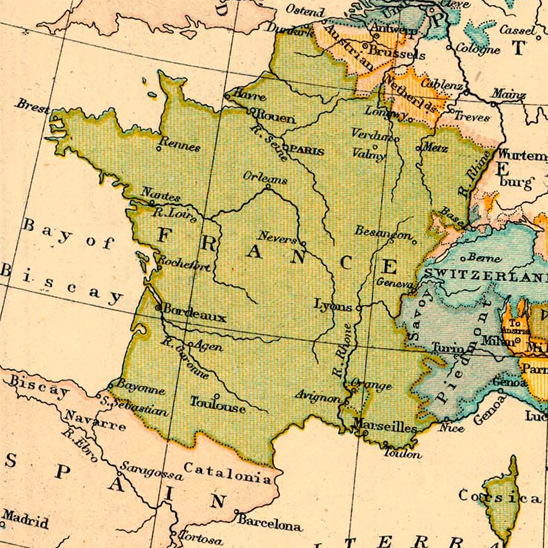 548x548 Saint-Domingue 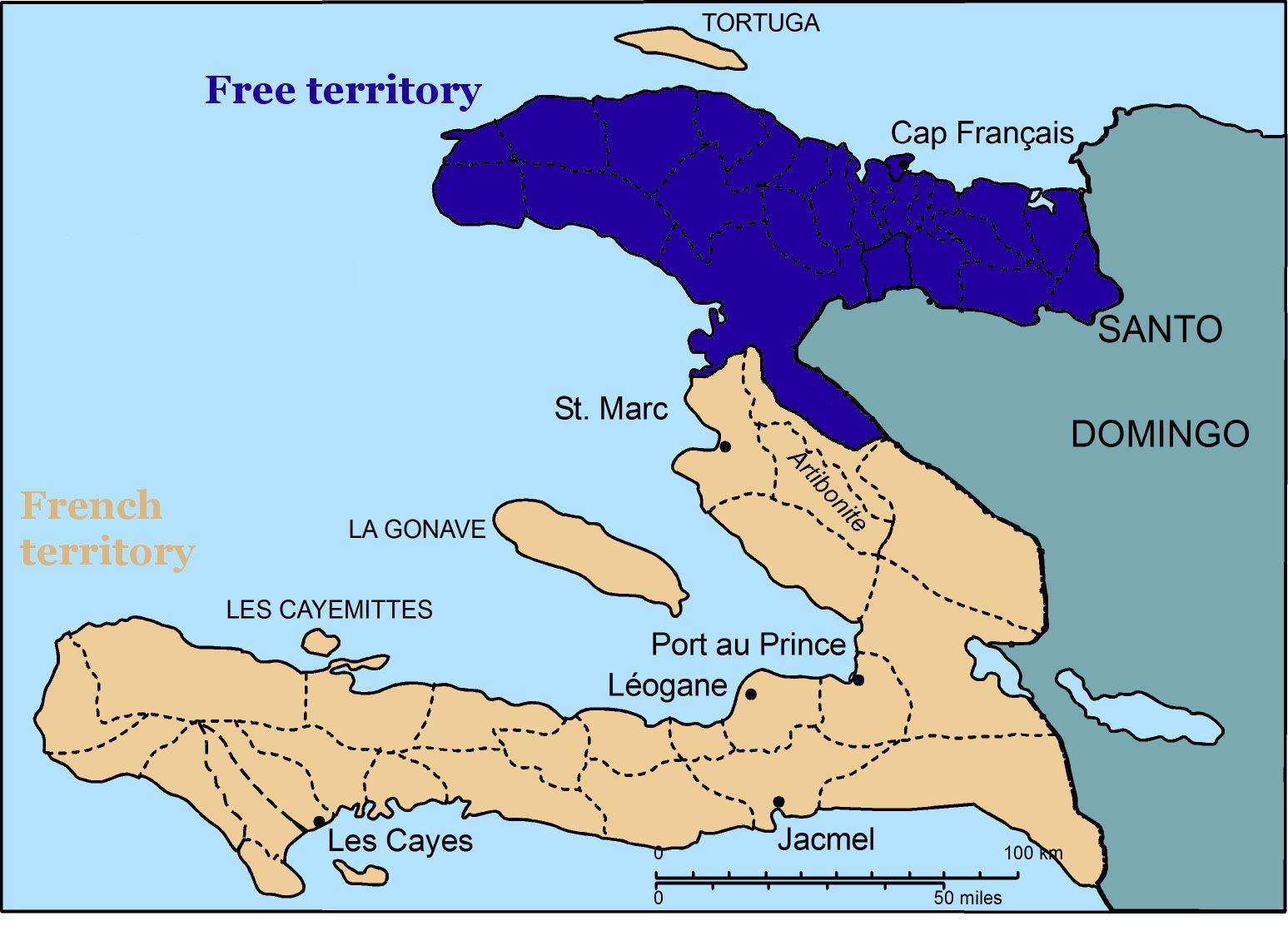 1547x1136 =Economy= - =Economic Sectors= Agriculture: 83% Manufacturing: 10% Trade: 7% Growth Rate: 0% = Unemployment: 18% =Government=  320x213 The Constitution of 1793 is a provisional document, most of it untested. - Popularity: Somewhat Poor System: Unitary Republic  356x599 Legitimist King: Louis XVII de Bourbon (unplayable)
Supporters: Nobility, Emigres, Moderates Laws of Succession: Agnatic Primogeniture Heir Apparent & Regent: Louis Stanislas Xavier, comte de Provence/Takanago (ktakanago@gmail.com) 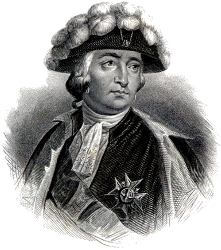 221x250 President: Louis Philippe , “Citoyen Egalité”/Colonel Wood (sacolonel.wood at gmail.com)
Supporters: Petit bourgeoisie, Jacobins  188x250 Prime Minister: Maximilien de Robespierre/sniper4625 National Assembly: 700 Seats (422 Jacobins, 187 Orleanists, 91 Independents) Elections: Members of the National Assembly are elected every year on a national basis. There is one deputy for every 40,000 citizens. President is elected every four years. Suffrage: All men over the age of 21. =Foreign Relations= Holy Roman Emperor: War/Bad Prussia: War/Bad Great Britain: War/Very Bad Russia:: Peace/Bad Poland-Lithuania: Peace/Good Spain:: War/Very Bad Sweden: Peace/Mediocre Denmark-Norway: Peace/Bad Brittany: War/Extremely Bad Portugal: War/Mediocre Sardinia: Peace/Bad Naples/Sicily: Peace/Bad Dutch Republic: War/Bad Switzerland: Peace/Mediocre Ottoman Empire: Alliance/Good USA (in New England): Trade Agreement/Mediocre USA (in New York City and New Jersey): Trade Agreement/Extremely Bad USA (in Virginia): Trade Agreement/Poor USA (in South Carolina): Trade Agreement/Good Republic of Vermont: Neutral Commonwealth of Southern America: Extremely good =Cabinet= The choice and dismissal of Ministers appertains solely to the President. The members of the Legislative Assembly may not be appointed. All powers exercised by the President must be approved by at least one other minister before it can take effect. Most minister’s executive privileges have been temporarily suspended.  222x250 Minister of Foreign Affairs: Georges Jacques Danton/Kellsterik (theninedynine at gmail) The Minister of Foreign Affairs is tasked with maintaining relations with foreign nations and the protection of French citizens abroad. Given the sheer number of war declarations coming in daily, he is doing rather poorly.  246x250 Minister of War: Gilbert du Motier, Marquis de Lafayette/ a bad enough dude (ehoovestol@gmail.com) The Minister of War has total control over the French Army and is responsible for the protection of French border provinces. Given international hostility toward France, the execution of this duty may be difficult. Minister of the Marine: *VACANT* PRESIDENT NEEDS TO APPOINT! The Minister of the Marine has jurisdiction over all seafaring French vessels and the colonial territories. It is his duty to ensure the protection of trade. 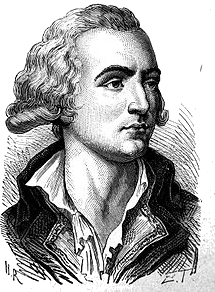 215x292 Minister of Justice: Marguerite-Louis-François Duport-Dutertre/ZearothK (zearothk@trioptimum.com) The Minister of Justice is responsible for all judicial affairs within France and ensuring the rule of law is maintained.  490x346 Minister of Finances: Louis Philippe the Younger/Servant (igorhorst at gmail.com). The Finance Minister is charged with maintaining state finances, agriculture, industry, commerce, roads and estates. Due to the poor state of the French economy, the position is in a state of turmoil and officials here rarely last long. =Factions=  320x214 - Club des Jacobins  237x250 Radical Republican (Montagnard) wing led by Louis Antoine Léon de Saint-Just/Epicurius (epicurius at aol.com). Liberal Republican (Girondin) without leadership, most fled. Faction is predominantly Montagnard. The Jacobins are the radicals of the French Revolution. They now call for increasingly extreme measures, like the abolition of the Catholic Church and the extermination of all enemies of the state. Their headquarters has been destroyed in a mysterious bombing. Represented by the colour red. - Parti Orléanist  490x346 Conservative wing led by Louis Philippe de Bourbon/Servant (igorhorst at gmail.com), Moderate wing led by the Marquis de Lafayette/a bad enough dude. The Orléanists have adapted somewhat well to the changing situation in France. They are divided into two factions, with one supports major reforms to the Constitution to stabilize the nation, the other a more slow process to allow for stability. - Monarchistes Français  194x250 Reactionary Monarchist, led by Georges Cadoudal/Arujei (rjohnlennon@gmail.com) Although they are not represented in the Legislative Assembly, this group represents an alliance between members of the former aristocracy, who wish to see a return of the absolute monarchy and landed aristocracy, and marginalized minorities like the Bretons who chafe under the centralization of the state. Although many fled following the ratification of the Constitution, those who remain in France have strong funding from outside parties. Both Jacobins and Feuillants are terrified of these émigrés because of their ability to influence French politics. - Les Enragés 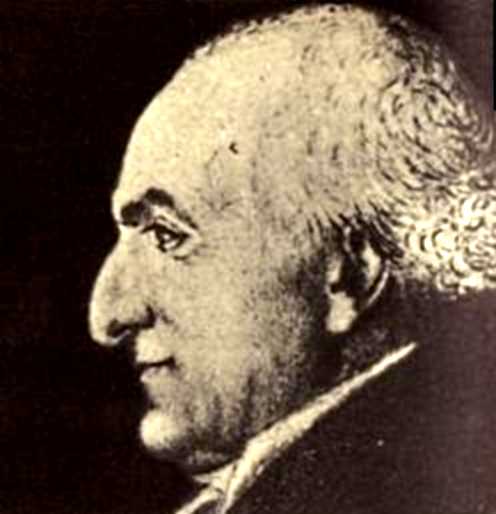 496x514 Babeufist (Populist Left), led by Jacques Roux/Stalingrad (stalingradlenin@gmail.com) (OUTLAWED) The crippling bread prices and a general lack of work in Paris have given some popular support to a movement that might otherwise have been a footnote of history. Even more radically left than the Jacobins, the Enragés rely on the support of the common man and encourage a thoroughly radical revolution. With the death of Babeuf and the betrayal of Madame Gouges, they rely solely on Roux for leadership. Departments: Following the ratification of the French constitution, the provinces of France were destroyed and the lands of the aristocracy dissolved. In their place, the Legislative Assembly established 82 departments. Each department is ruled by an Administrator and receives three representatives in the Legislative Assembly, except Paris which receives only one. =Newspapers= L'Ami de la France Editor: Prince-Royale Louis Philippe Ideology: Orleanist Readership: Middle class, some readers in the aristocracy. Headlines: “DEMOCRACY IS HERE AT LAST." "LOVE IN PARIS, THE STORY OF A JACOBIN AND A ROYALIST". "CAN WE TRUST PRESIDENT LOUIS PHILLIPE (THE ANSWER IS YES)." L’Ami du Peuple 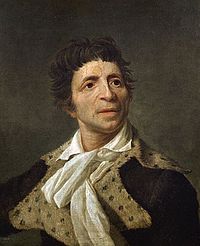 200x246 Editor: Jean-Paul Marat/pattersongsa@gmail.com and Saint-Just Ideology: Radical Republican Readership: Middle class exclusively. Headlines: “WHAT THE HELL DID YOU DO TO AMERICA, BURR?” "MARIE ANTOINETTE: WORST THING EVER." Le Père Duchesne 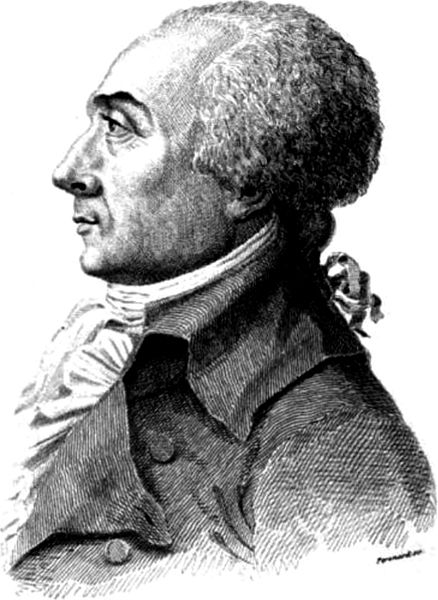 438x600 Editor: Jacques Herbert/SexyBlindfold (estafortaleza (at) gmail (dot) com) Ideology: Radical Republican Readership: Urban poor, Parisian lower class. Headlines: “LET'S INVADE AUSTRIA IN THE FUCKING WINTER, AND MORE FANTASY STORIES." "WHO THE FUCK LET THE JACOBINS BE IN CHARGE AGAIN?" "DEATH TO AMERICA." Breiz Atao Editors: Georges Cadoudal and Armand Tuffin Ideology: Breton Nationalism Readership: Bretons, aristocracy, some supporters in France Headlines: "THE FINAL WILL AND TESTAMENT OF KING LOUIS." "MARIE ELECTED DUCHESS IN UNSURPRISING UPSET." =Military=  256x270 The French military has initiated major reforms since the establishment of the Republic. Although France still struggles from defections and difficulty training soldiers, these problems are slowly being resolved. At the moment, France’s most pressing concern is the First Coalition who threatens to destroy the nation and its people. Grande Armée de la République  196x250  194x250  294x388 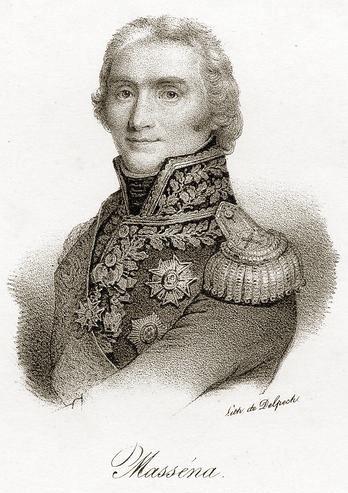 348x493 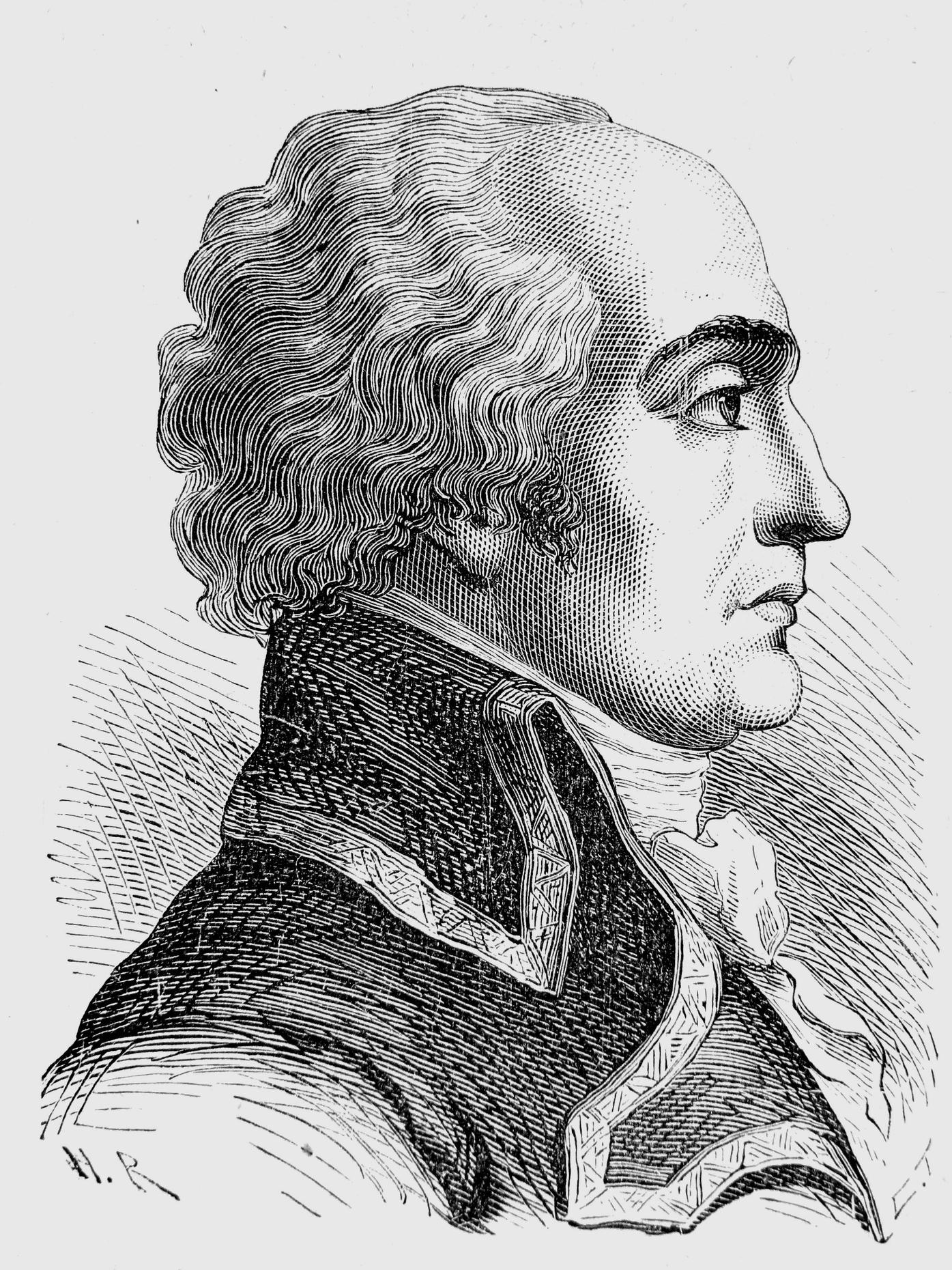 1395x1860 Maréchal de France: Alexis Le Veneur de Tillières/AndItsAllGone (anditsallgone@gmail.com) Forces: 220,197 soldiers, 16,353 cavaliers, 324 cannons Organization: 2 corps, 10 brigades, 50 regiments, 500 companies --- l’Armée du Nord (Republican) [44723 soldiers, 500 cavaliers, 2000 patriottes, 50 Cannons. Lille. commanded by André Masséna/Viscardus] --- l'Armée du Rhin [31500 soldiers, 5000 cavaliers, 70 Cannons. banks of the Rhine. Alexis Le Veneur de Tillières/AndItsAllGone (anditsallgone@gmail.com)] --- l’Armée Expéditionnaire [17345 soldiers, 30 cannons. North. Napoléon Bonaparte/YF-23 (yfaltmiau at hotmail dot com)] --- l’Armée du Centre [37847 soldiers, 1,000 cavaliers, 24 cannons. Paris. Général Lafayette/a bad enough dude] ---- l’Armée des Pyrénées [35000 soldiers, 5000 cavaliers. stationed at Spanish Border, Général Joseph Marie Servan de Gerbey/A RICH WHITE MAN] --- l’Armée des Alpes [40000 soldiers. stationed at Grenoble, Général Michel Ney/rakovsky maybe (rakovskymaybe@gmail.com)] French Navy 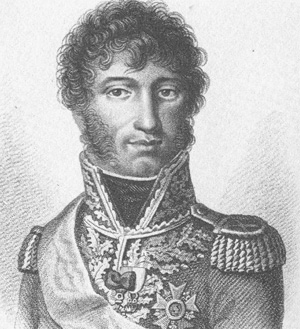 300x329 Admiral: Joachim Murat/stalin-chan (stalin@c0balt.com) Forces: 66 ships of the line, 61 frigates, 45 corvettes, sizable merchant marine Organization: 2 fleets, several smaller patrols --- Flotte de l’Atlantique [assigned 35 ships of the line, 30 frigates. Blockading Brittany. commanded by Louis Thomas Villaret de Joyeus/vacant] --- Flotte de la Méditerranée [assigned 31 ships of the line, 26 frigates. based in Toulon. commanded by Louis-Armand de Rohan Constantine/vacant] Situation: New command structure, many remaining officers skeptical. Many vessels in disrepair. Swiss Guard  276x250 Oberst: Major Karl Josef von Bachmann/Enjoy (sw_faulty at hotmail dot com) Forces: 130 guardsmen (in prison), 100 guardsmen with the Dauphin Situation: Highly trained, highly effective mercenaries serving as the King’s personal guards. Their forces were recently shattered by the National Guard in an assault on the Royal Palace. The Swiss government is outraged by the slaughter of their citizens and struggling on how to respond. National Guard  246x250 Commander-in-Chief: Gilbert du Motier, Marquis de Lafayette/ a bad enough dude (ehoovestol@gmail.com) Forces: 15787 National Guardsmen, 12 American advisors, 12 cannons Situation: Fair morale stabilizing and poorly organized. Training is underway and discipline steadily improving. Recruits are drawn mostly from the middle class, with some among the poor. =Foreign Threats=  416x599 L’Armée des Princes Commander: Louis Stanislas Xavier, Regent of France and Navarre Sponsors: Prussia, HRE, Great Britain Forces: 2485 Gallowglass mercenaries, 6717 infantrymen, 1530 cavalrymen and one squadron of hussars Situation: Recruiting in Brussels. Excellent training, poor morale. Well-armed. Queen’s Association Commander: Various, disorganized Sponsors: Quebecois wealthy, American and British intellectuals Forces: 700 fighters (Montreal), 500 fighters (Philadelphia), 175 fighters (London) Situation: Extremely well-armed and high morale, but non-existent training. ‘Fighters’ consist solely of armchair intellectuals and bored upper class. =Rebellions and Militias= Babeufist Farmer’s Revolutionary Collective Leader: Gaius Gracchus, Tribune of the People/vacant Ideology: Babeufist Popularity: 15% in Picardy Forces: 4301 peasants, 25000 theoretically available for mobilization Situation: Organized following the death of Babeuf and the uncertain future Babeufists face in France. Some support undercut by the Land Reform act. Ar Diebiñ Bretoned Leader: Georges Cadoudal Ideology: Breton Nationalism / Conservatism Popularity: 35% in Brittany Forces: 3890 peasants, 40 noblemen Situation: Recently distributed muskets and farming instruments. Aid from unknown source has stopped due to blockade. Some training. Great morale. La Garde Révolutionnaire Leader: Olympe de Gouges Commanders: Olympe de Gouges Ideology: Women’s Liberation Loyalties: Mostly Enragés, with some Jacobin sympathies Popularity: 1% in Paris Forces: 787 sans-culottes, 227 “working women” Situation: Volunteer militia formed after the March on the Champs-Élysées, made up of disenfranchised peasants and artisans. After betraying Babeuf, many deserting the organization! La Garde Libre/The Cambions 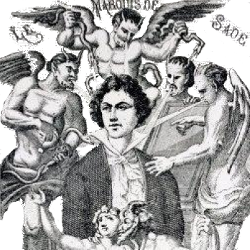 250x250 Commander: Napoleon Bonaparte Administrator: Donatien Alphonse François, Marquis de Sade/Fall Sick and Die (ccferrara@gmail.com) Ideology: Far Left/Anarchism Popularity: 2% in Paris Forces: Unknown Situation: The main fighting force in Louisiana. Morale is high but training is virtually non-existent. Napoleon is attempting to introduce some much needed organization into the group Haiti Leaders: Several, in disarray 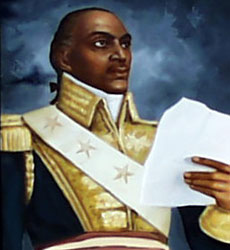 230x250 Commander: Toussaint Louverture/EccoRaven Ideology: Abolitionist Popularity: 85% among black Haitians, no support in Metropolitan France Forces: 28,210 slaves, 3 cannons, 1 mortar Situation: Morale is very high, training is mediocre but improving. Occupying all of Saint-Dominique Other Important Individuals and Groups: Archdiocese of Paris In December of 1792, the French Church officially split with the Catholic one. The project was a brain child of Louis Philippe the Younger. Time will tell whether it is successful or not. Archbishop: American Embassy to France Although he may not wield significant power on the European stage, the American ambassador and his government serve as symbols of democracy and republicanism. He has gotten himself into a spot of trouble with the Jacobins as of late. Matters are further complicated by the destruction of his embassy. 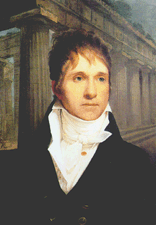 Ambassador: William Short/Tao Jones (sa.taojones at gmail) Swedish Embassy to France The Swedes would seemingly be an irrelevant power were it not for their potential to counter the Russian threat to France.  200x273 Ambassador: Gustaf af Wetterstedt/Hutter British Embassy to France Along with setting British foreign policy concerning France, the current ambassador also has a vast amount of personal wealth to draw upon. 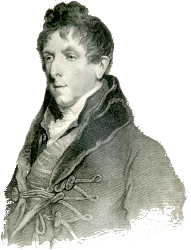 191x250 Ambassador: Duke George Leveson-Gower/Incy (incysa at gmail) Prussian Embassy to France The Prussian ambassador is among the most virulent of enemies of the French state. 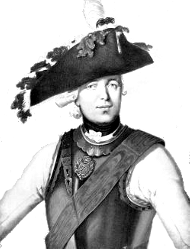 191x250 Ambassador: Friedrich-Wilhelm von Franco/Ramba Ral Ottoman Embassy to France The Ottoman Empire is a far off land for most French citizens and a second rate power for most of their leaders. Perhaps their ambassador can change this attitude. 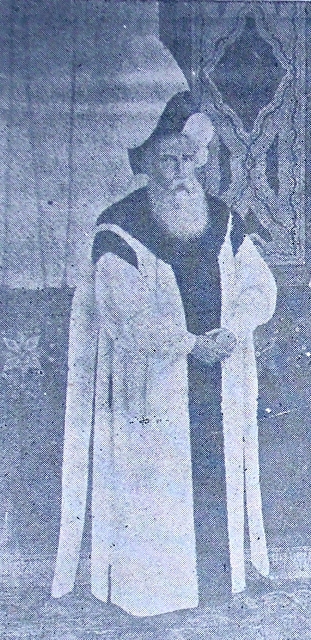 311x640 Ambassador: Koca Yusuf Pasha  209x247 Claire Lacombe/Rincewind Noted feminist and playwright, Lacombe is certain to be an entertaining character of the Revolution. 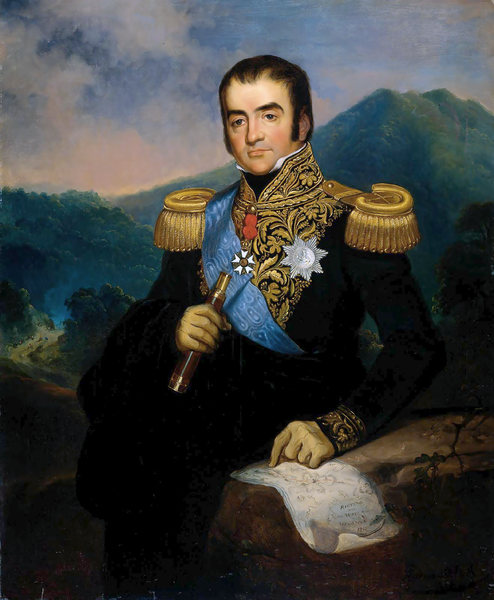 494x600 Herman Willem Daendels/Brutus Salad (xerxes.ihatespartans@gmail.com) Leader of the Patriottes faction outside of the Netherlands, he seeks the overthrow and end of the autocratic Dutch Republic and the institution of a true republic in the region. To this end, he has cast his lot in with the French. 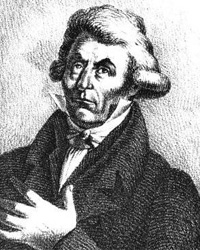 200x250 Alexis-Vincent-Charles Berbiguier de Terre-Neuve du Thym/Sword of Damocles (praeaton@gmail.com) A “demonologist”, this man has recently been seen in the company of the Swiss Guards. 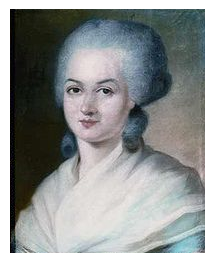 216x268 Marie Gouze/Maxico Roberto (maximo . roboto on Gchat) Although initially in support of the Revolution, Marie Gouze was disenchanted when she learned women would not be allowed to participate. She is an influential writer in Paris but extremely controversial.  220x277 Madame Roland/vacant The wife of noted Jacobin Jean-Marie Roland, the Madame exerts a great deal of influence over her husband and through him the members of the Legislative Assembly. 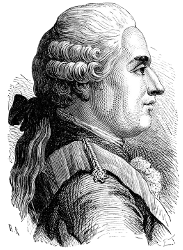 183x250 Louis Stanislas Xavier, comte de Provence/Takanago (ktakanago@gmail.com) The younger brother of the King of the French and the de facto leader of the émigrés outside France. His recent declaration of regency is a threat to the stability of the country and is currently recognized by most of Europe, as well as the King himself. =Stats= 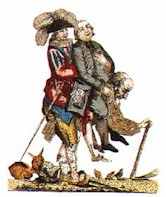 Agriculture: Undercapitalized with below average average crop yields. Poor harvests have lead to unfavorable conditions for local markets. Situation was improving, but blockade means France will have to be self-sufficient. Industry:: Mostly textiles, with some mining and metalworking. Stabilized somewhat by ample subsidies and an influx of cotton from America. American markets also proving quite amenable to French manufactures, but British blockade threatening to rob this avenue from France. New projects in the Rhine under construction. Food: Mild famine has resulted in a massive spike in prices but agricultural investments have resulted in a minor improvement in diet. Brittany is struggling heavily but surviving. Nobility and bourgeois eat well. Diet quality in Paris is on the decline. Labor: No restrictions on working hours or hiring practices Education: 47% literacy for men, 35% for women. Based on the apprenticeship system, with Catholic seminaries being used as an alternative for poor families. Some seminaries expanding admission thanks to education budget increases. Private tutors used for nobility. Public Health: Major cities contain small sewers but require updated water systems. Health care largely provided by the clergy, who now receive funds from the state for that purpose. Crime: Approximately 3,660 officers are used to defend strategic sites like the palace, royal mint and major roadways. Well-organized and trained but corrupt. Trade: France receives a large influx of goods from her colonies. However, her exports have fallen out of favor within Europe itself. America recently established as trade partner. Colonies: Mostly in the Caribbean and India, holdovers from numerous unsuccessful wars against Britain. Slavery is widespread and forms the lifeblood of the overseas economy. Compromise with Toussaint a complete failure, sugar trade has been diverted to England and colony likely to rebel again. Finance: Assignats have largely replaced the livre as the de facto currency of France. Inflation steadily increasing thanks to Robespierre’s budget. Urbanization: Less than a quarter live in cities. Population growth primarily in rural areas. Religion: Catholics dominate political life but Calvinists and Jews are tolerated. The Civil Constitution of the Clergy makes priests direct employees of the state. Ethnic Groups: 53% French, 46% Occitan, 1% Corsican. Official toleration of local languages but increasing momentum towards French as the sole language of the state. =Budget= Due to the poor economic policies of the monarchy, the treasury of France was bankrupt by the time the Constitution was enacted. In order to ensure economic stability, church property was forcibly seized and used as a standard for the currency. Despite the decrease in royal power, a large portion of the yearly budget was used to build and maintain the property of the nobility. As a consequence of underfunding the police and low accountability among tax collectors, Revolutionary France often had difficulties collecting taxes. quote:Contributions Directes: Liberté ou la Mort - A Haiti Nationsim Year: Winter 1792 (turns represent 3 month seasonal cycles)  Country: Haïti Population: 510,000 Capital: Port-au-Prince Other Major Cities: le Cap, St-Marc, les Cayes, Jacmel  =Economy= - =Economic Sectors= Agriculture: 70% Manufacturing: 2% Trade: 28% Growth Rate: 2% = Unemployment: 14% =Government=  The country is administered under a military dictatorship, ostensibly a transition government after the chaos of the revolution. The Governor-General is in charge of foreign affairs, war, justice, and finances. - Popularity: Incredibly Popular System: Military dictatorship  Governor-General: Toussaint Louverture/EccoRaven Ideology: Abolitionist Popularity: Very popular =Foreign Relations= France: Peace/Very Bad Great Britain: Peace/Good Spain:: Peace/Mediocre Sweden: Peace/Mediocre Brittany: Peace/Decent USA: Peace/Bad =Factions= Gens de Couleur 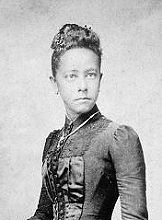 Leader: Julien Raimond / (vacant). Numbers: About 25,000 Situation: Black Haitians freed before the revolution, working mostly as artisans, merchants, and landowners. The cultural elites; they profess the Catholic faith, speak French, and are largely literate. With the fleeing of most of the white populace, they are also the wealthiest group on the island. They were somewhat sympathetic to the colonial administration, though they are pleased for the prospect of greater independence from France. Departments: The newly-formed nation is largely divided into the same six departments used by the colonial administration: Artibonite, Centre, Nord, Ouest, Sud-Est, and Sud. Each department is further divided into dozens of arrondisments (counties) and communes (towns). Due to the chaos of the revolution, there is little centralized governmental authority, and each commune largely runs independently. =Newspapers= Le Journal St-Domingue Editor: Julien Raimond Ideology: Haitian Nationalism Readership: Literate Haitians, primarily gens de couleur. Headlines: "VICTORY", "SO WHAT DO WE DO NOW?" =Military= Haiti's military consists almost entirely of guerrilla soldiers armed with muskets and farm equipment. Training is mediocre, provided by military academies established during the revolution, the most prominent of which is Chez Cabre, located outside le Cap. But what they lack in skill and weaponry they make up in spirit; ousting the French has made them even more confident in their indomitability. Forces Armées d'Haïti  Commander: Henri Christophe/ (vacant) Forces: 25210 irregular freemen, 3000 trained soldiers, 7 cannons, 2 mortars Organization: Largely unorganized. Situation: Morale is very high, training is mediocre but improving. Acting as impromptu police forces now that the revolution is won. Graduates of the military academy Chez Cabre are organized into small company units occupying previously-abandoned forts dotting the country. Soldiers spread throughout the nation, predominately in major cities. Haitian Navy "Admiral": Henri Christophe Forces: A few dozen merchant ships. Organization: No organization Situation: No command structure; all ships are designed for local, intra-national civilian use, with very little in the way of defensive capabilities. =Foreign Threats= None currently. =Rebellions and Militias= 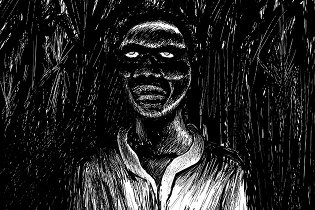 Les Zombies Leader: Baron Samedi Forces: 800-1000 "zombie" guerillas. Situation: A paramilitary force led by the mysterious Baron Samedi. Engages in violent operations during darkest nights, invoking mystical folklore to terrorize survivors. Strong suspicions among Haitian elites that the Baron is actually Toussaint himself. =Stats=  Agriculture: Extensive sugar plantations, harvested by the former slaves. Many abandoned or destroyed plantations across the landscape whose fields lie fallow. Industry:: What few industries existed before the revolution have been put into complete disarray since. Food: General surplus from fleeing of the white non-agricultural populations. Labor: No restrictions on working hours or hiring practices. Slavery and other coercive labor outlawed. Education: 6% literacy for men, 2% for women; almost exclusively among gens de couleur. Primary education conducted through local parishes. Wealthy elites hire private European tutors and send their children to overseas universities. Public Health: Major cities contain few sewers. Health care largely provided by clergy and local healers. Crime: Military force acting as impromptu police officers. General disorder throughout the nation. Trade: Primarily trading with Britain, selling sugar revenues. Sweden and Spain eager to have part of it. Finance: International trade uses the French livre, but the pound sterling becoming more prominent as trade with Britain increases. Local transactions largely through bartering. Urbanization: Most live in the countryside on the thousands of plantations. Cities rather emptied by the fleeing colonials. Religion: Most practice Catholicism. Somewhat divided by ethnicity, with gens de couleur being almost exclusively Catholic, but with many freed slaves practicing syncretic faiths, including Vodou and "Samedism." Freedom of religion, with no state-sponsered church or belief. Ethnic Groups: 93% black, 5% gens de couleur, 1% white French, 1% other. No official language, though French is used among the cultural elites, with Creole being used by everyone else. =Budget= Needless to say, the revolution has halted most tax collection services, at least for now. But at its height Haiti alone produced more wealth than the entire American Thirteen Colonies combined. quote:Contributions Directes:
|
| # ? Nov 29, 2012 02:41 |
|
 Good night, sweet prince. Feel free to rejoin as someone else (maybe Marie Theresa)? You are a really great player and we would love to have you, either as a participant or to help with the turns. Good night, sweet prince. Feel free to rejoin as someone else (maybe Marie Theresa)? You are a really great player and we would love to have you, either as a participant or to help with the turns.  quote:
|
| # ? Nov 29, 2012 02:43 |
|
|
| # ? Nov 29, 2012 02:47 |
|
If you notice any errors or problems with the turn, please e-mail CVortex and myself immediately so we can fix them. I am afraid we were rushing to get this turn out the door, so there was some confusion and miscommunication between us. We will make edits wherever necessary. Turn is due 1 December, 2012.
|
| # ? Nov 29, 2012 03:15 |
|
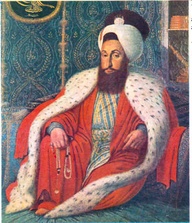 Sultan Salim the 3rd, of the ottoman empire, commander of the faithful before the battle with the austrians posted:Turks, Serbs, Croats, Egyptians, People from across the ottoman empire, your sultan speaks.
|
| # ? Nov 29, 2012 03:31 |
|
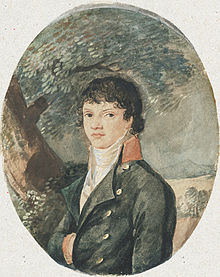 Veur Marshal: Aimé Picquet du Boisguy The Army of All-Brittany will resist to the end against the French assault on our people! Email: rogue0071sa@gmail.com
|
| # ? Nov 29, 2012 03:33 |
|
 'Steward of the Duchess' Charles Armand Tuffin, marquis de la Rouerie Steward of the Duchess for the Elective Duchy of Breizh/Brittany for Mari Tereza Charleza I ar Vourboned Speech to the Breton Nation posted:We have prevailed! *cheers* We have defeated one of the strongest armies in the world! *more cheers*
|
| # ? Nov 29, 2012 03:39 |
|
 On the recent invasion of Brittany posted:The Bretons huddle in their hovels, cheering their victory and adulating their prepubescent Duchess. But what have they won?
|
| # ? Nov 29, 2012 03:49 |
|
 'Steward of the Duchess' Charles Armand Tuffin, marquis de la Rouerie Steward of the Duchess for the Elective Duchy of Breizh/Brittany for Mari Tereza Charleza I ar Vourboned I hereby recommend the adoption of the following Budget for Brittany and her defence. Budget posted:Contributions Directes:
|
| # ? Nov 29, 2012 03:53 |
|
Georges Cadoudal From his Diary, after the Battle of Nantes posted:...Beyond any of our wildest hopes, God has seen fit to deliver us from the hand of the wicked for now. His mercy is limitless, His strength beyond any earthly strength, His plan unfathomable to man.
|
| # ? Nov 29, 2012 04:13 |
|
sniper4625 posted:
 'Steward of the Duchess' Charles Armand Tuffin, marquis de la Rouerie Steward of the Duchess for the Elective Duchy of Breizh/Brittany for Mari Tereza Charleza I ar Vourboned Damn their warnings, damn their lies, They did see the Bretons rise! Damn their warnings, damn their lies, They did see the Bretons risssseeeee!
|
| # ? Nov 29, 2012 05:16 |
|
 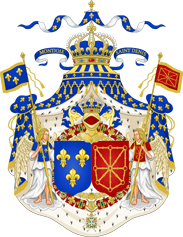 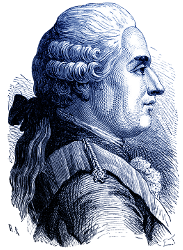   Louis Stanislas Xavier, Regent of the Kingdom of France and Navarre, comte de Provence, Commander of L’Armée des Princes, Glorified Ally of Brittany, Knight of the Order of the Ermine, acting in lieu of His Majesty The King, the young Louis XVII Speech to a carefully chosen crowd of royalist nobles posted:A great tragedy has befallen my family, and my kingdom. My brother, His Most Christian Majesty The King, Louis XVI, was shot by murderous revolutionaries.
|
| # ? Nov 29, 2012 05:22 |
|
 Alexis-Vincent-Charles Berbiguier de Terre-Neuve du Thym Paper awaiting peer review. A recent dissertation published by the University of Paris posted:Welcome to Hogwarts: a Theological Ordnance Survey of Witches in Paris
|
| # ? Nov 29, 2012 05:39 |
|
 We, William the First, by the grace of God Emperor-elect of America; King of Virginia, Delaware, Pennsylvania, New Jersey, Georgia, Connecticut, Massachusetts Bay, Maryland, South Carolina, New Hampshire, North Carolina, and Rhode Island; Most Serene Duke of Vermont 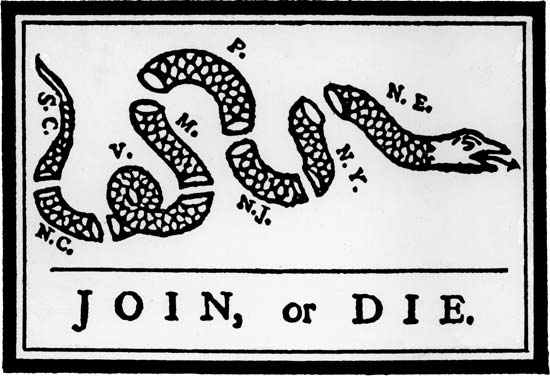 From the 'First Address to the People of America' posted:We hold that it is an acknowledged truth that the republican experiment has failed in America. Aaron Burr did not only murder the man Alexander Hamilton, he murdered the entire constitution - indeed, the entire dream - that Hamilton and Washington stood for. Through his crime, we see the cold, hard truth: a society cannot be built on the social contract of Rousseau -- no, it must be built on the firm foundations of sovereign Throne and holy Altar, to ward us against the evil that beats within our own hearts.
|
| # ? Nov 29, 2012 05:40 |
|
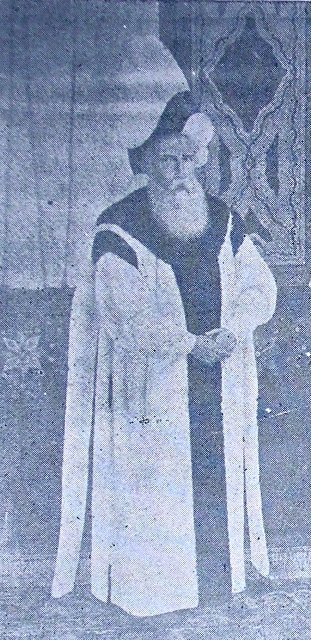 311x640 Koca Yusuf Pasha, Ambassador of the Ottoman Empire Takanago posted:
IT pains me, grieves me, wounds me, terribly to hear your brother is dead. Though we ended up on opposites sides in this mess in the end, he was a good man, he should not have been offered as a sacrifice on the altar of politics, no man should. His murderers should be brought to justice, for that is what they are, murderers. Why can there not be a system without blood? Why can there not be a succession without pain? The Republicans demand bloody revolution for their system, the monarchists demand bloody succession wars. Why must these empty hollow wars be fought over who rules?
|
| # ? Nov 29, 2012 05:43 |
|
 490x346 Louis Philippe de Borboun, "Citoyen Unité", Minister of Finances I have received news that our creditors have refused to loan us any money. I had thought that, due to the war effort, that authority over the budget was transferred over to Lafayette and Robespierre. Apparently their budget has neglected to pay interest to our creditors, leading them to consider us in default. After some negotiations with Lafayette and Robespierre, I introduce a brand new budget to help put ourselves on a sustainable economic path, while still fighting the war effort. The most important part of this budget is that we are doing a partial default. We will default only on foreign creditors, while still paying our domestic creditors. We explored all other options, and this was the least bad. quote:[quote]Contributions Directes:
|
| # ? Nov 29, 2012 05:51 |
|
 Alexis Le Veneur de Tillières, Maréchal de France, commandant l'Armée du Rhin Address to assembled troops, Easter 1793 Soldiers of the Rhine! You've endured a harsh winter, made still more bitter by admittedly incessant drills. I've heard your cries of 'Enough!' Yet I cannot heed them! You place your trust, your very lives, in my hands and who am I to shirk that duty for the sake of my own good feeling? You may indeed hate me for it, but I will ensure that you survive this war to complain to your grandchildren about that old battle-ax Tillières who drilled you until your toes were numb! I can bear your mutters and curses but I could not bear it if I sent you to battle with anything less than the very best training I could give you! In the coming months, Prussian soldiers will march into your nation, seeking to subjugate the free men and women who proudly call themselves citizens of France! Ask yourselves: who do you want to meet them? Some lazy rabble, barely able to work their muskets? Or the best-trained, most skilled free soldiers in Europe? When battle comes, trust in your training, your officers, and your comrades in arms. Your families and the future of France depend upon it! Long live France!
|
| # ? Nov 29, 2012 06:18 |
|
Since I mentioned it in IRC, that was William Short's retirement post from this game; if the game were AmericaSim I'd enjoy trying to form the Empire of America out of the ruins of the constitution, but CV and I agreed that it was outside the scope of FranceSim and would both be a lot of unnecessary work for the GMs and not so much fun for me, as I wouldn't be interacting with many other players. If Gantolandon wants to rejoin as Duchess Mari Tereza I, I will rejoin as Veur Steward Auguste de Bonteville Hay. Otherwise, I'll rejoin as the Duchess.
|
| # ? Nov 29, 2012 06:50 |
|
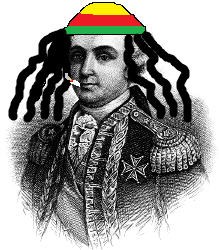 Hey man, where the fuck did the Haiti actions go? I invented something, damnit! That's racist, man
|
| # ? Nov 29, 2012 07:13 |
|
 President of the First French Republic Louis Philippe Joseph d'Orléans, “Citoye Egalité” I offer my condolences to the Capet family and all of the families who have lost loved ones in this time of crisis. I take no pleasure in the death of any Frenchman, even Louis Capet. While he was a flawed man, like any man he deserves to be treated with respect in death. Thus, I extend the option for his family to have him entombed at the Basilica of St. Denis alongside his grandfather, Louis XV. He shall be the last King laid to rest at the Basilica as although I reigned briefly as King of France I shall not be buried there as I am not a King, but a Citizen of France, like the rest of you! Let us use this time to reconcile, and to face the dawning of a new era. A new era without Kings, where men are governed by free will and liberty! A new era where France moves forward to confront its true enemies! Let us join hand in hand, arm in arm, and march forward to meet the Prussians, to meet the Austrians, to meet the Bretons! Let us fight together, as one! ONE GOVERNMENT! ONE NATION! ONE BLOOD! VIVE LA FRANCE! VIVE LE REPUBLIQUE!!
|
| # ? Nov 29, 2012 07:28 |
|
 Général Lafayette, Minister of War, Commander of the National Guard Letter sent to the National Assembly from the camp of l’Armée du Centre Having marched into Brittany, intent on crushing their uprising and uniting France, I have come to a greater understanding of this situation. I thought those Bretons which had taken up arms against us were lackeys of foreign powers, tools of the legitimists who would throw us back into feudal chains... and they are. But now I realize the conman "Tuffin" was able to deceive them only because of the foolish actions of the previous government, of the late Louis Capet and his discriminatory taxes. There is no reason that France cannot address these concerns, and in doing so remain whole. I present before the Assembly the Rights of the Minorities of France. This bill will guarantee to the Bretons, Occitanians, and all other minorities of France full protection of their religious practices, full protection of their language, and full protection of their traditions. This Republic is for all Frenchmen, whatever language they speak or creed they adhere to, and there is no reason to breed unnecessary conflict. Though "Tuffin" may spread filth that claims otherwise, Bretons are French, and deserve the respect of the state. Following the passage of this bill a short period of amnesty will be granted to the Bretons. Though their plucky forces have shown some courage despite the mismanagement of the highwayman "Tuffin," they simply cannot prevail against the rest of France. Those that lay down their arms and allow order to be restored, an order that now respects their traditions, will have no harm come to them. However forces who continue to resist past this point, who fight for no reason, will be dismantled with no mercy. Any and all nobility found in Brittany, be they Breton or no, are to be treated as the emigres they are and executed for treason. Their land will continue to be directly redistributed to the peasants they fight to hold in bondage. Attached to this bill is a clause condemning Charles Armand "Tuffin" and Georges Cadoudal as Enemies of the People, to receive the capital punishment as soon as captured.
|
| # ? Nov 29, 2012 08:55 |
|
I'll rejoin as the Duchess Mari Tereza.
|
| # ? Nov 29, 2012 09:18 |
|
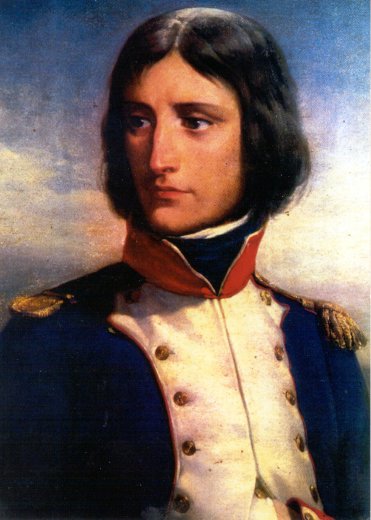 Colonel Napoléon Bonaparte, Emergency Military Governor of the Territory of Louisiana I am fully aware that the world is busy with vastly more significant issues. However I do have a proclamation to make, one reached upon agreement between myself, and messieurs de Sade & Brissot. It is with regard to an elephant that has been in the room since the beginning, and which we finally agreed on how to address. It is with regard to the name "Louisiana", obviously deemed inappropriate considering the collapse of the Bourbon legacy and the monarchy. So we, the men from France, sought to find a new name. A name evocative of "Louisiana"'s culture, of our mission and role here. We are people sent from a more advanced place sent to tame the wilderness and bring civilisation to the swamps and vast unexploited expanses. This was, once, the state of la patrie; it was how France was when the Romans expanded into Gaule, bringing with them the torch of civilisation. Indeed this is the current state of this land as well; and so, now that Gaule Cisatlantique is a land on the forefront of enlightenment, nous, les peuples francophones in Gaule Transatlantique are charged with bringing elightenment to this great vast land, like the Romans before us. As such, all references to and instances of Louisiana are to be replaced with Gaule.
|
| # ? Nov 29, 2012 09:19 |
|
I'm so lonely here in the ottomans, we have five bretons now, three people in gaule. tons in france, and like I've had the first turn in the last two times cause i'm fighting half the war with austria all by myself.
|
| # ? Nov 29, 2012 09:42 |
|
OOC: Wasn't tax efficiency supposed to increase this turn, due to Police investiment?
|
| # ? Nov 29, 2012 10:06 |
|
 What a waste of a regicide this was. I'm not sure if we are to pin this on the Bretons or the False Republic, but by Christ, that's some piss-poor assassination. If you were to leave it to me, you wouldn't have had any of this prissy hopping around in uniforms and knocking on doors, listening to speeches and hamfistedly throwing pistol shots in the air, hoping that a bullet might just land on a tyrant. If this is the Bretons' doing, it only comes to prove that their way lies nothing more than the tiresome palace intrigues that are doomed to rule the fate of any monarchy (or, better said, "tyranny by blood"). Enthrone a king, backstab to enthrone a new one, drive the people to war and hunger to support whatever fat simpleton with a crown you're siding with at the time, rinse and repeat. If this was done by the Jacobins (who to this day are kind enough to provide us with mirth and laughter by insisting on calling themselves "revolutionaries"), it only comes to prove what a gross bunch of inefficient, inoperant buffoons they are, and how inept their management of french affairs is. Why, there was no legitimacy in this killing! No mass tribunal assemblied to lynch him, no crowd gathered to spit on the corpse, they did not even have the decency to hack off his head and parade it on a stake! How they saw fit to divert time in planning and funding this example of how to make the death of a king a dull and boorish affair really boggles the mind.
|
| # ? Nov 29, 2012 13:02 |















